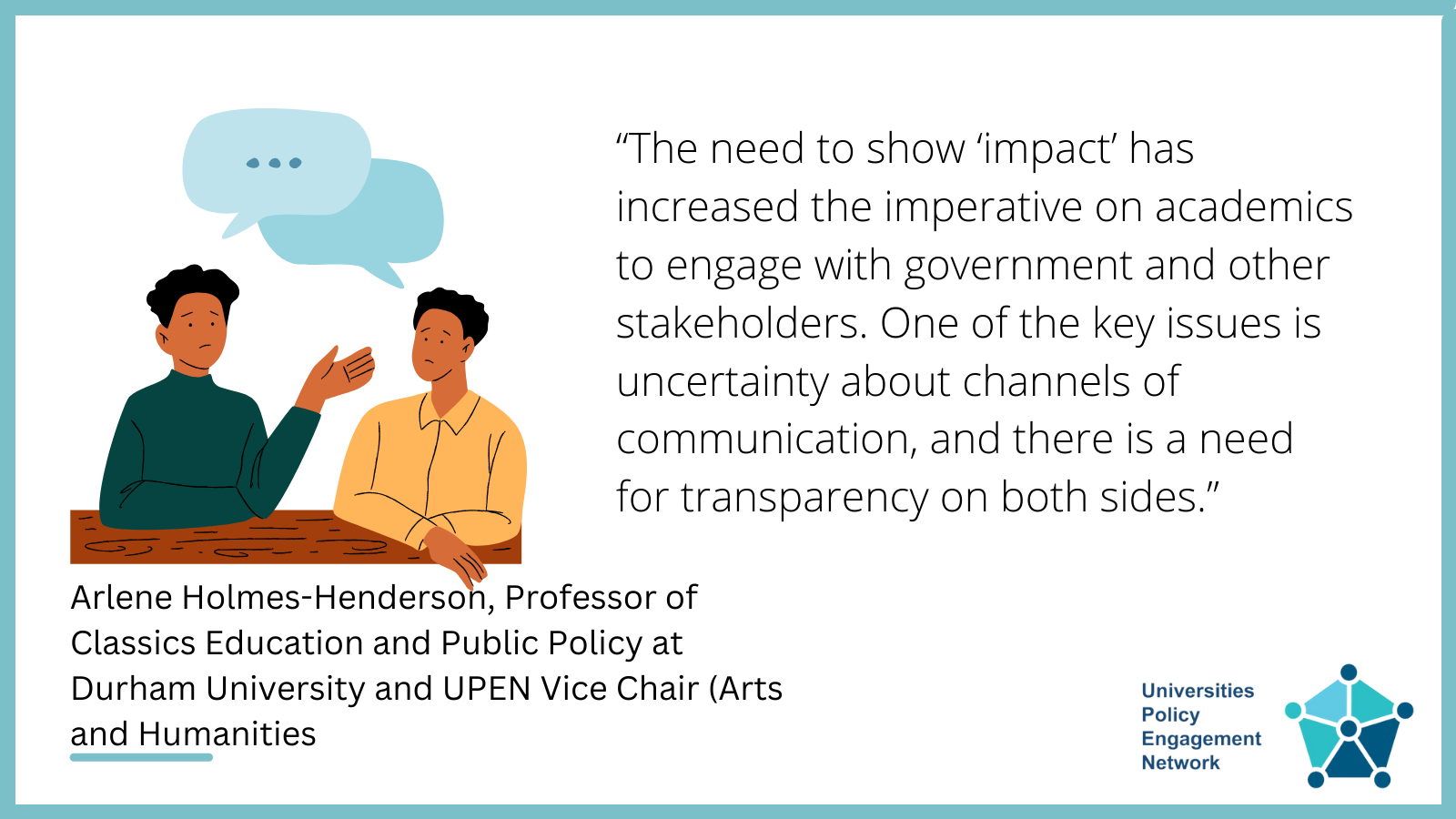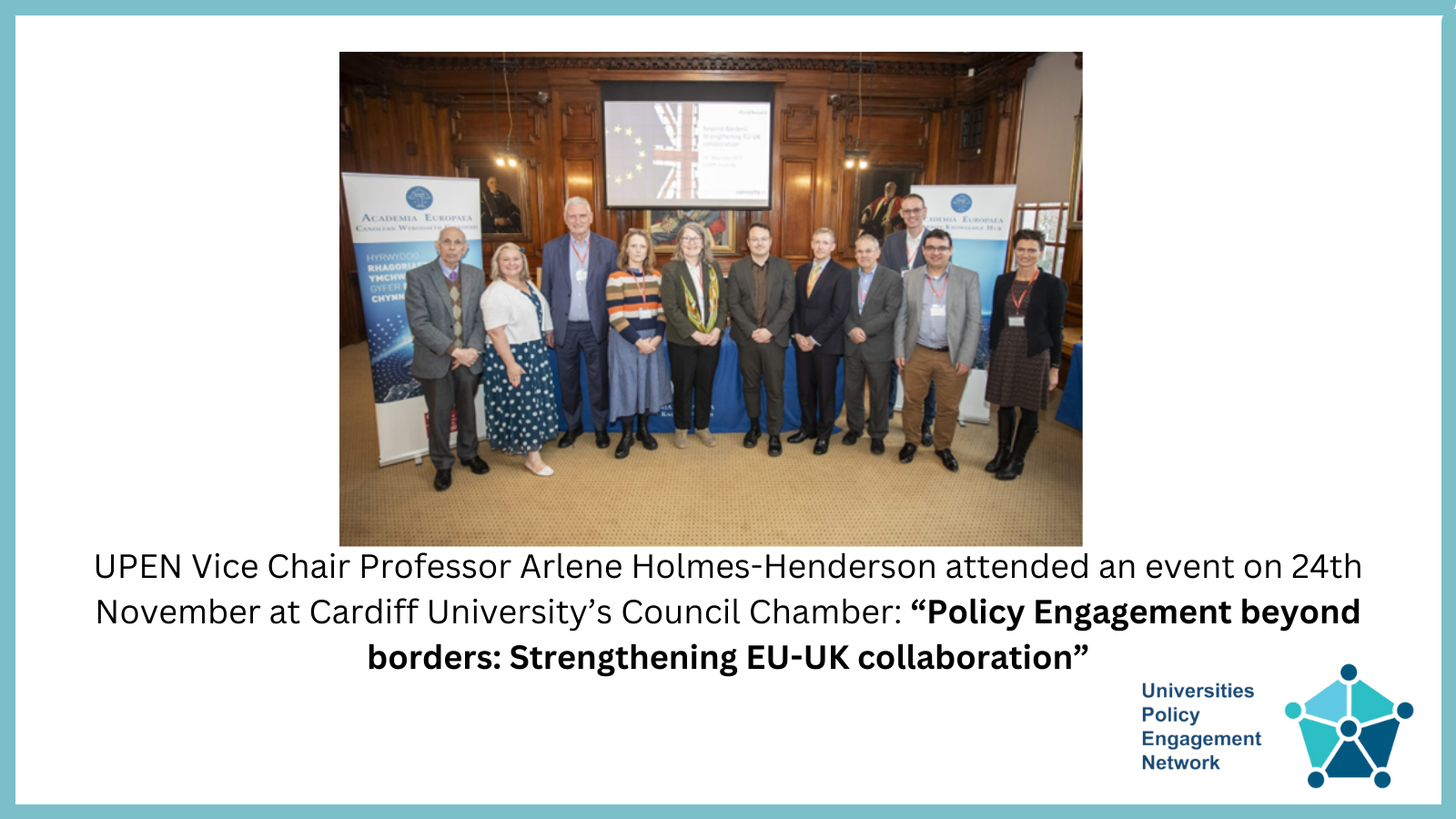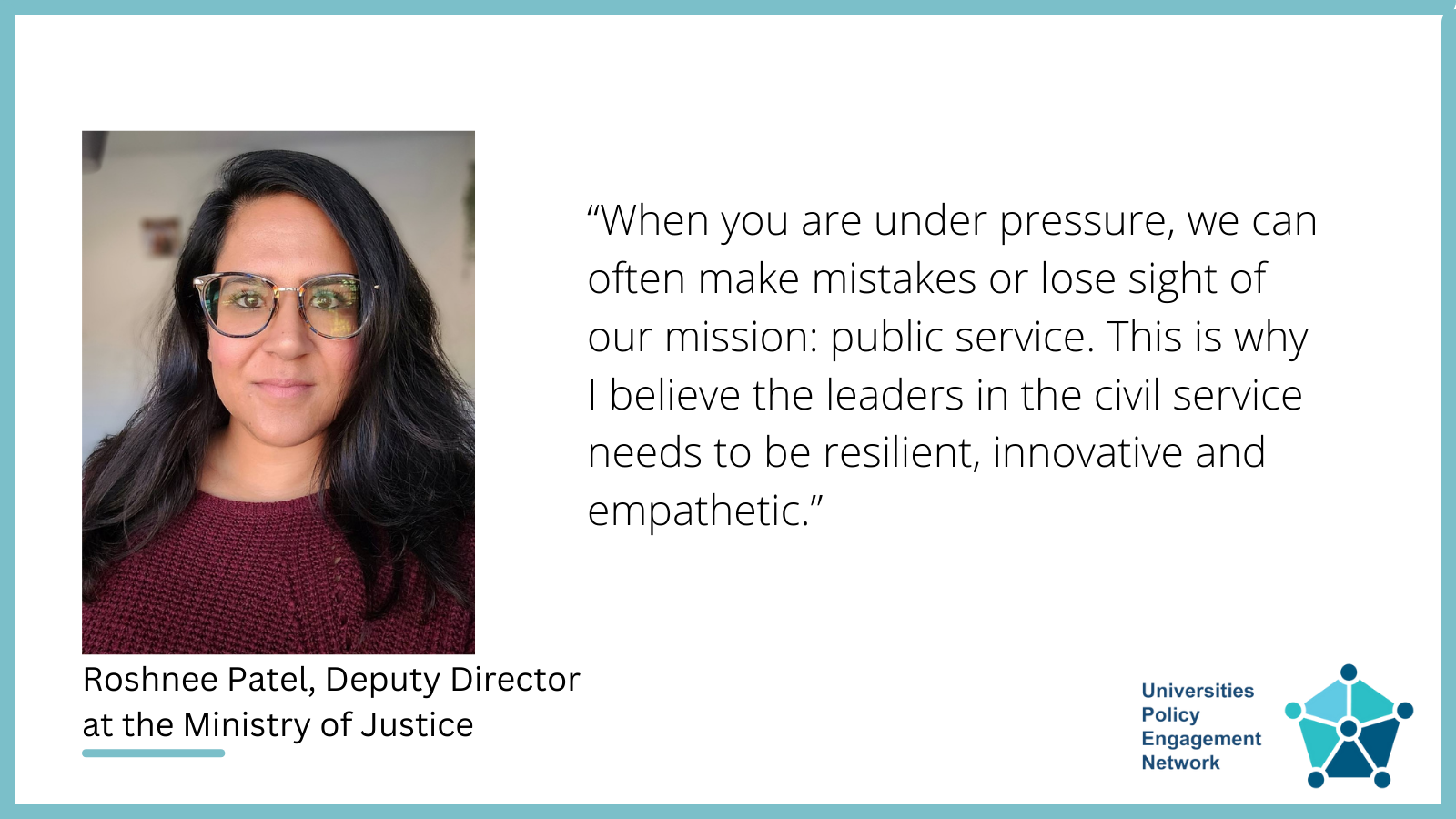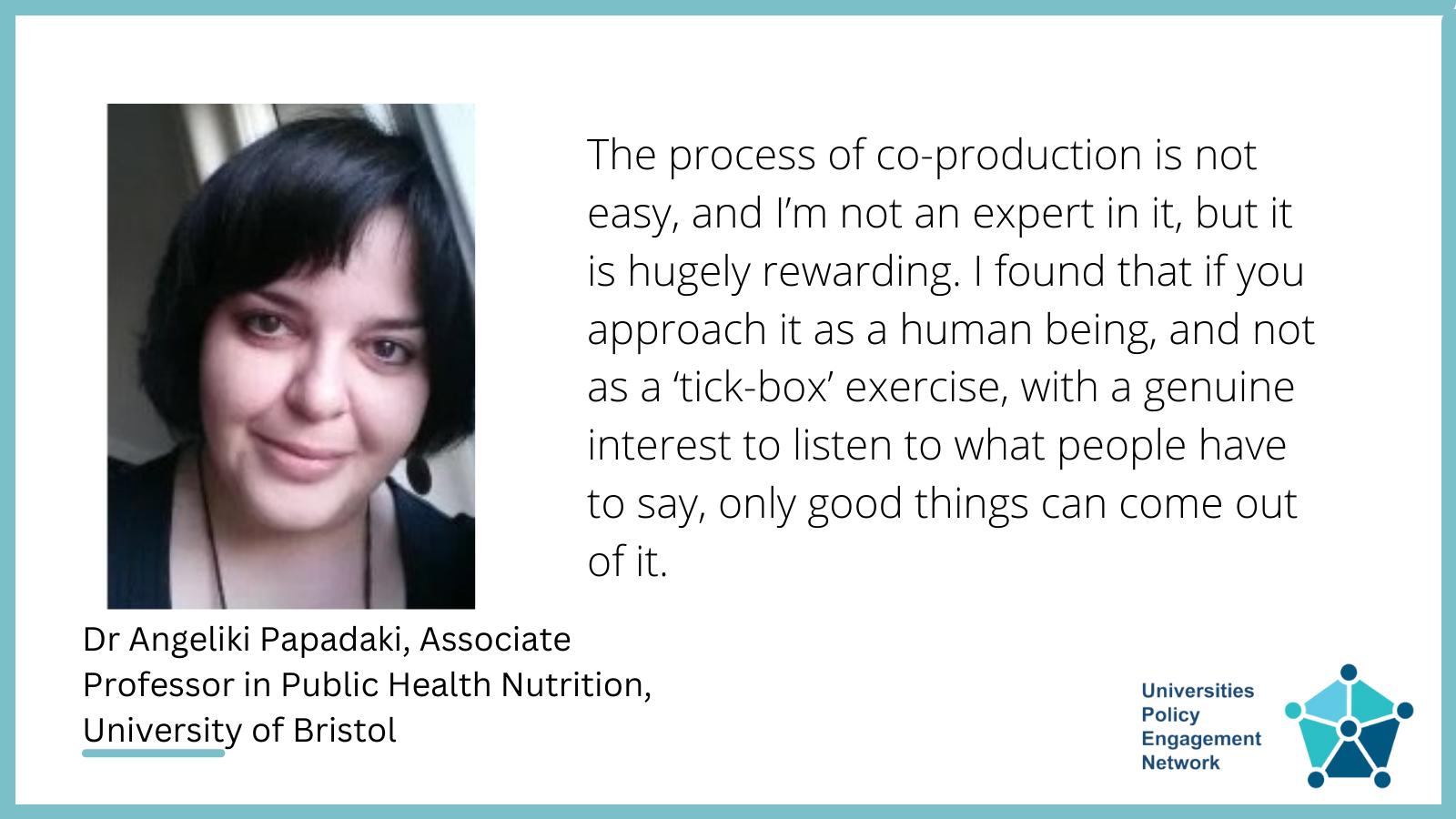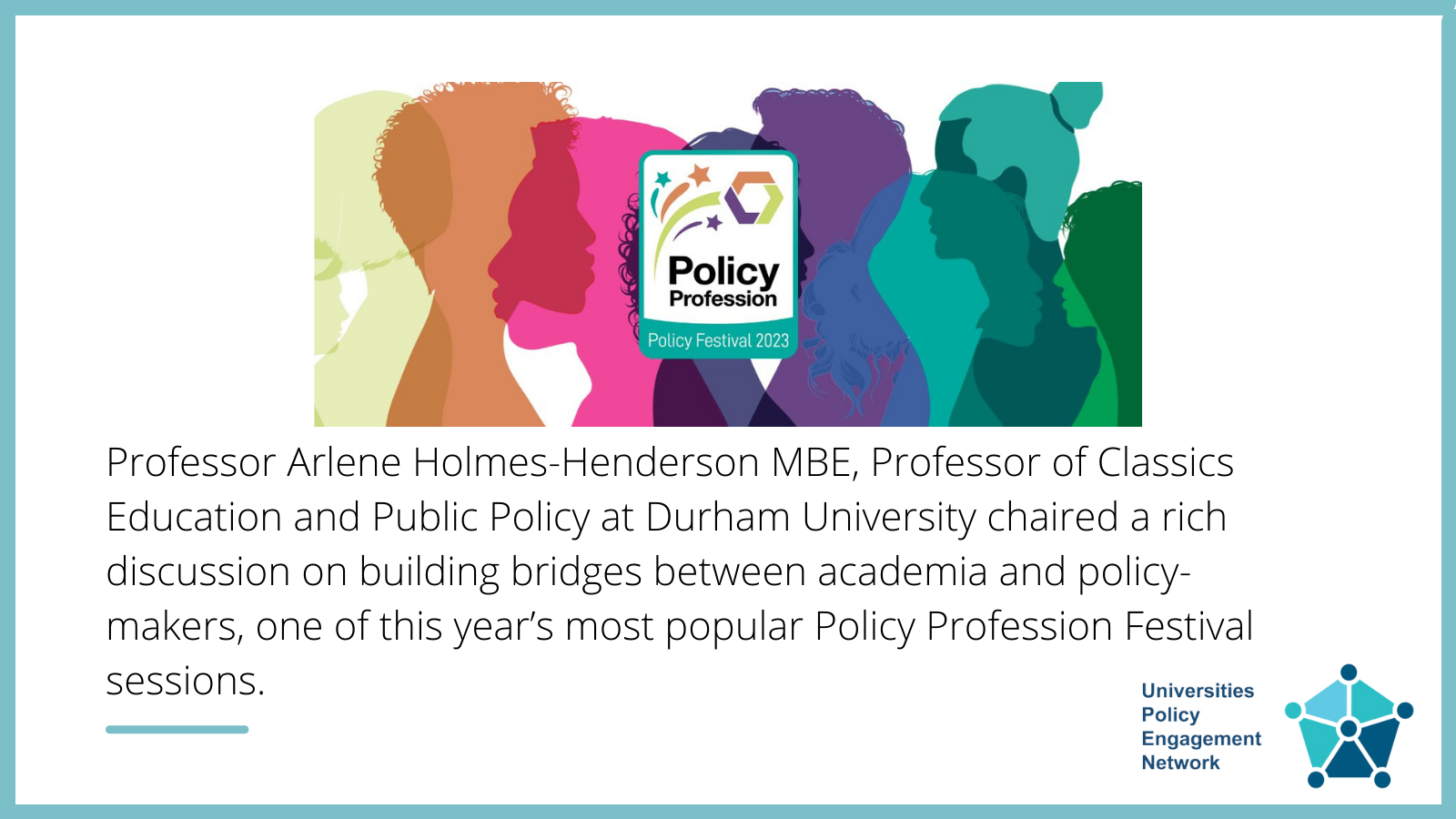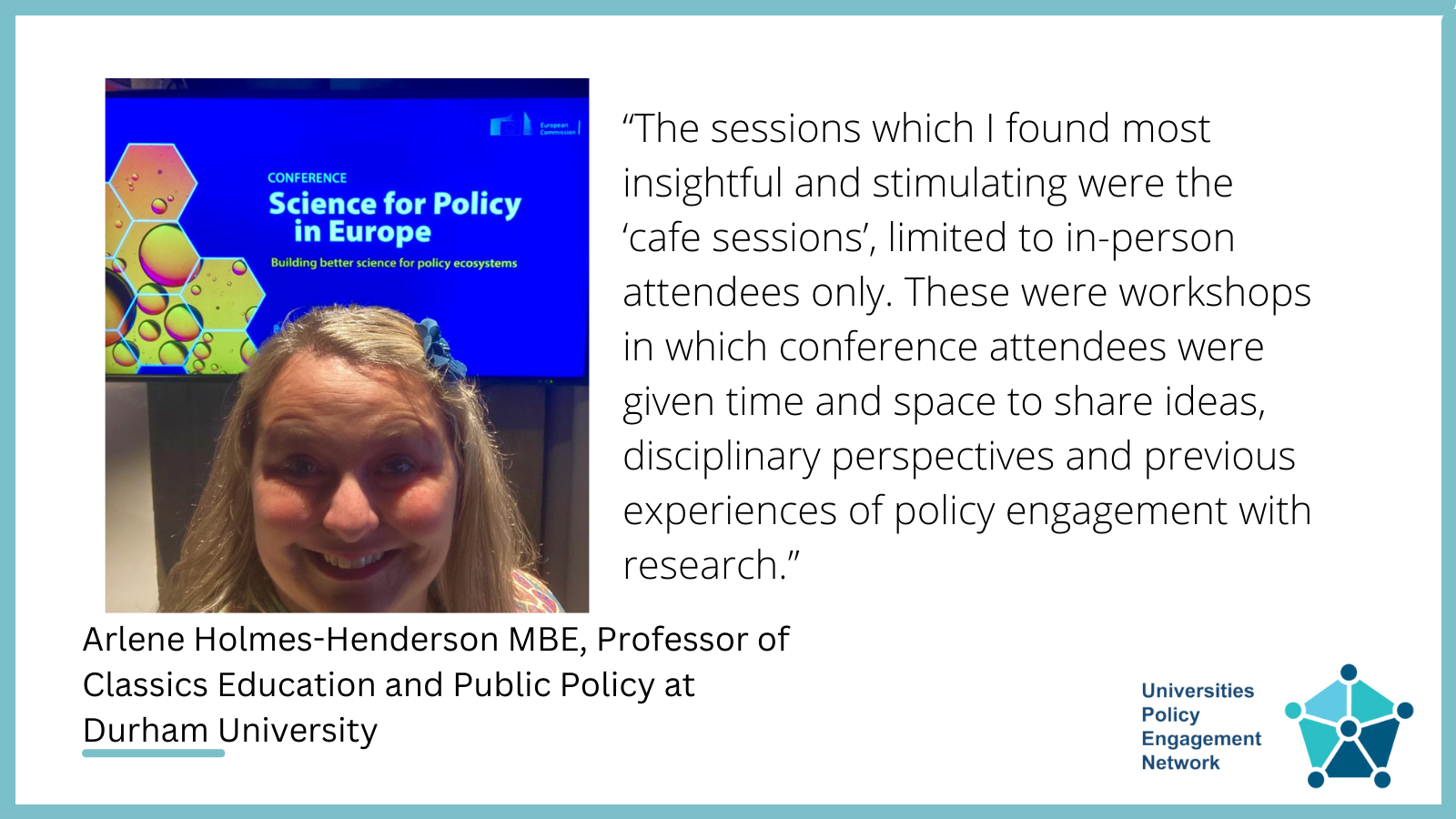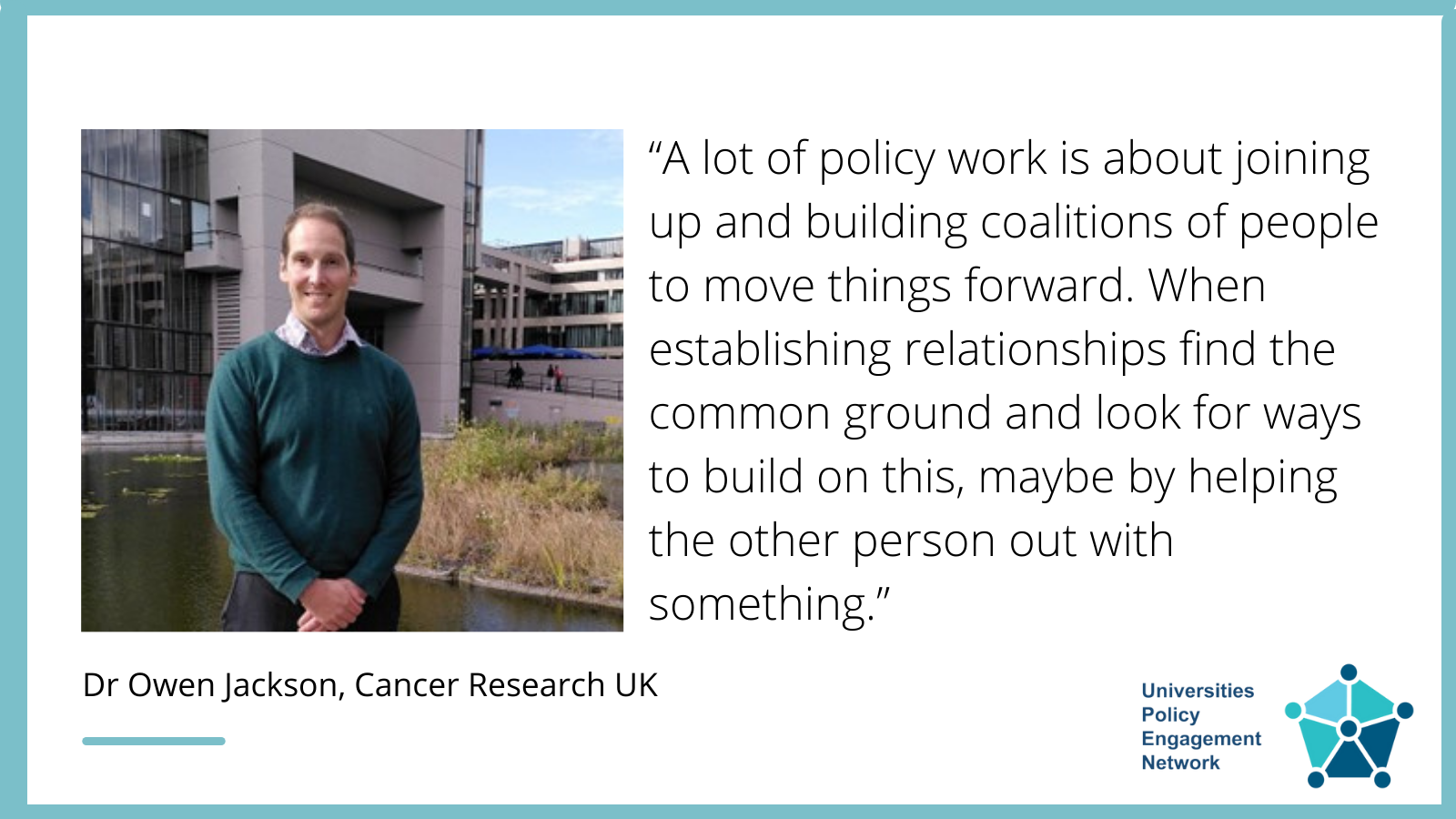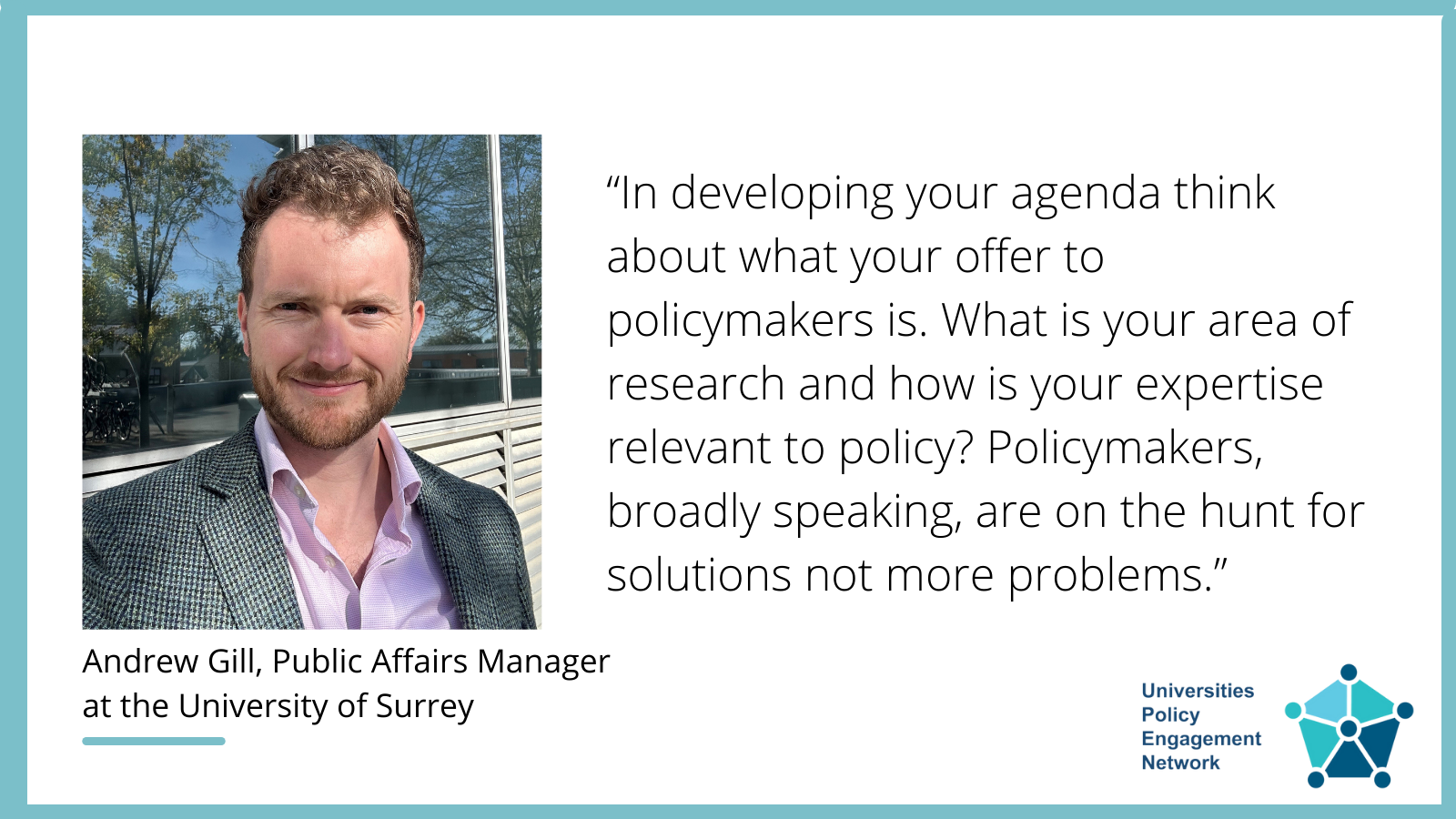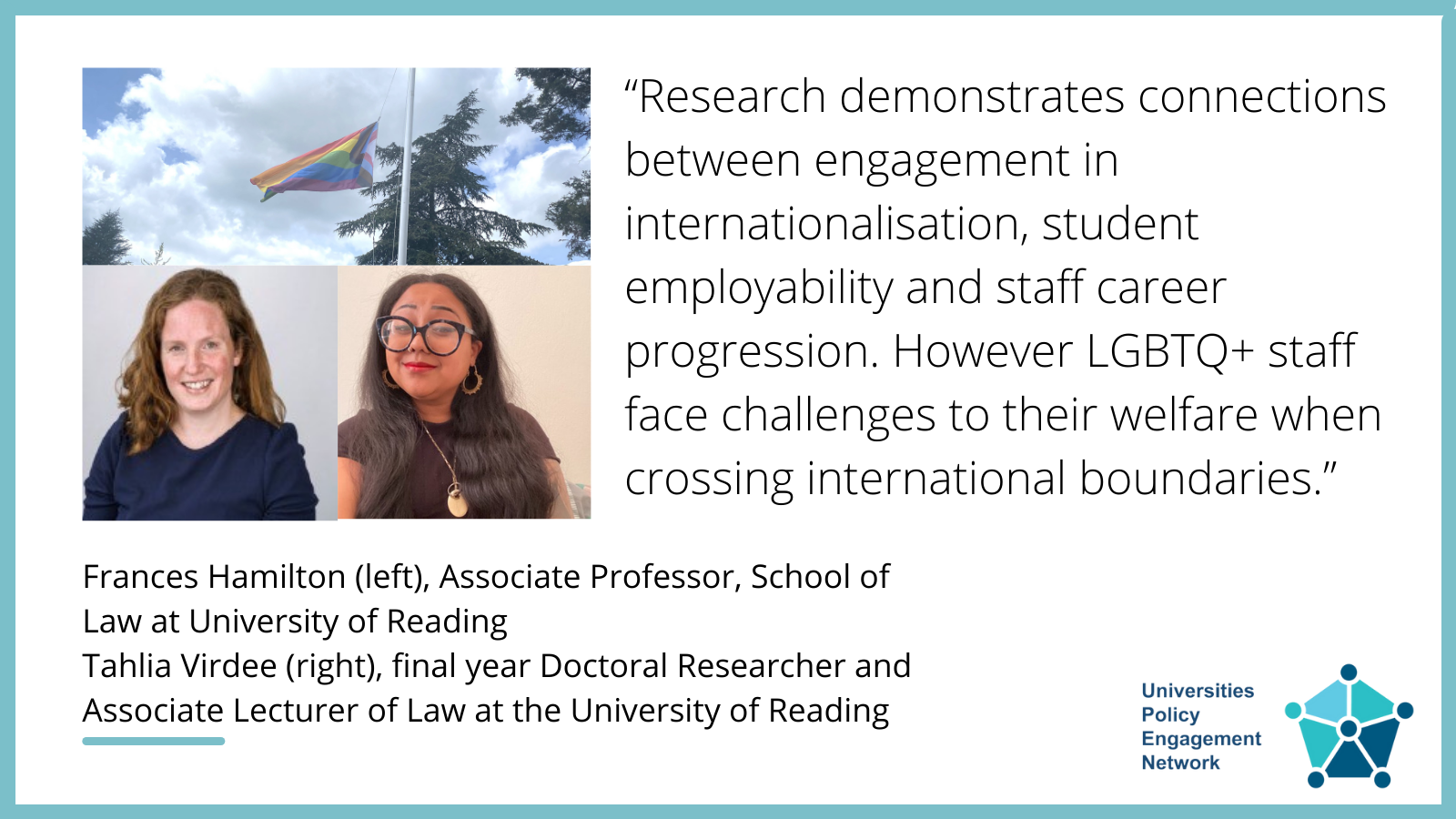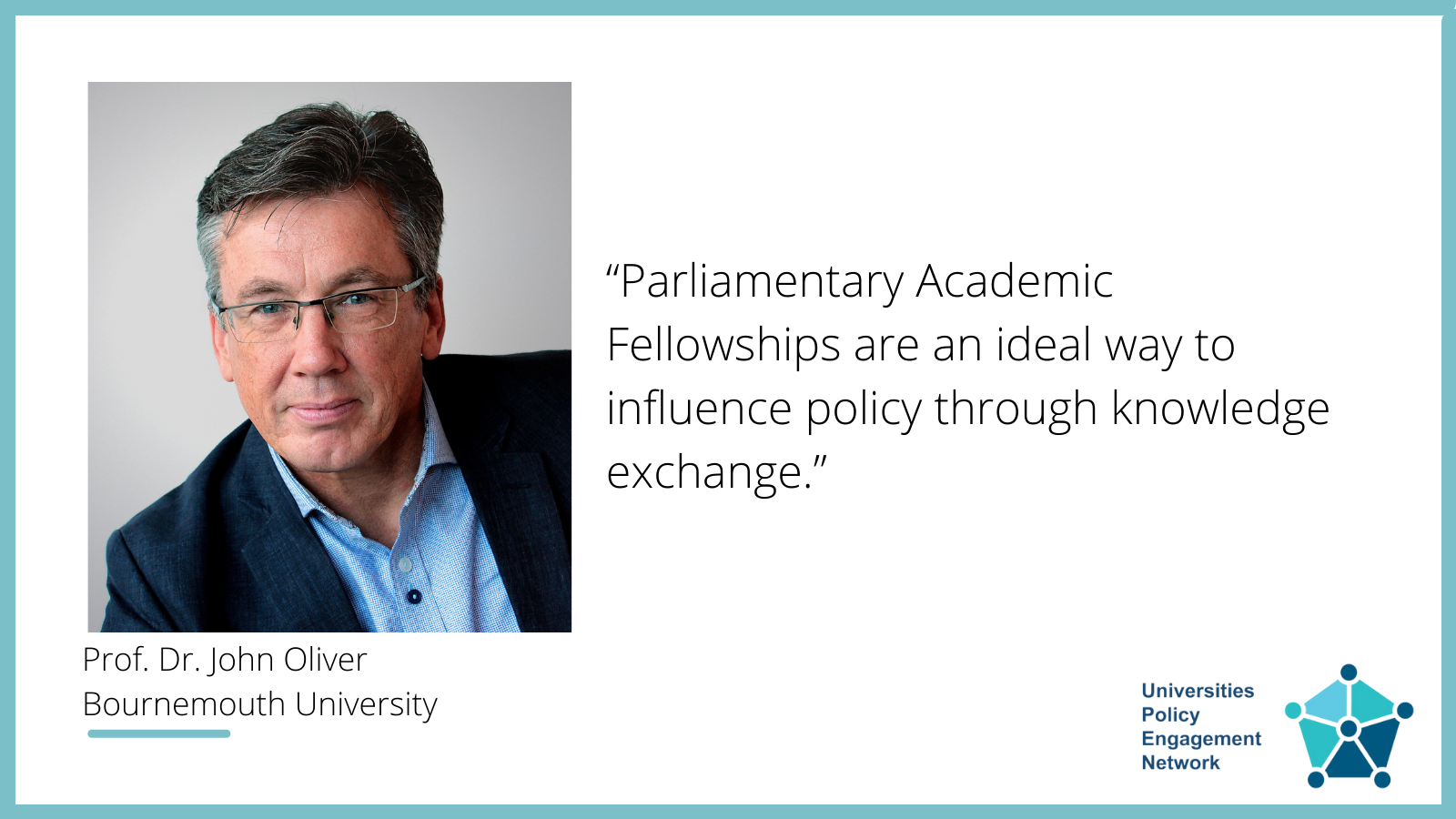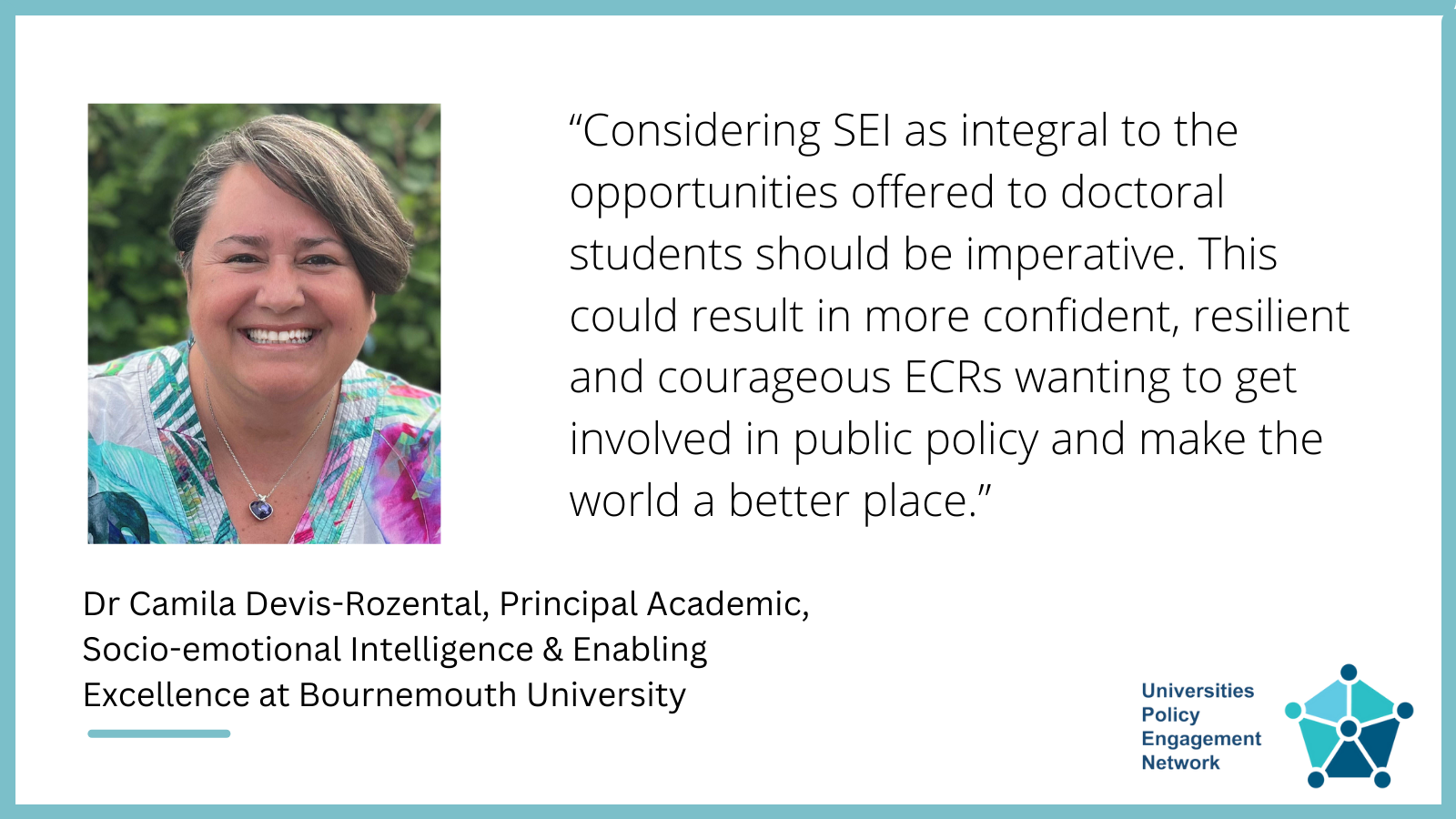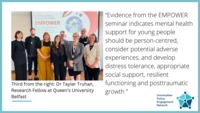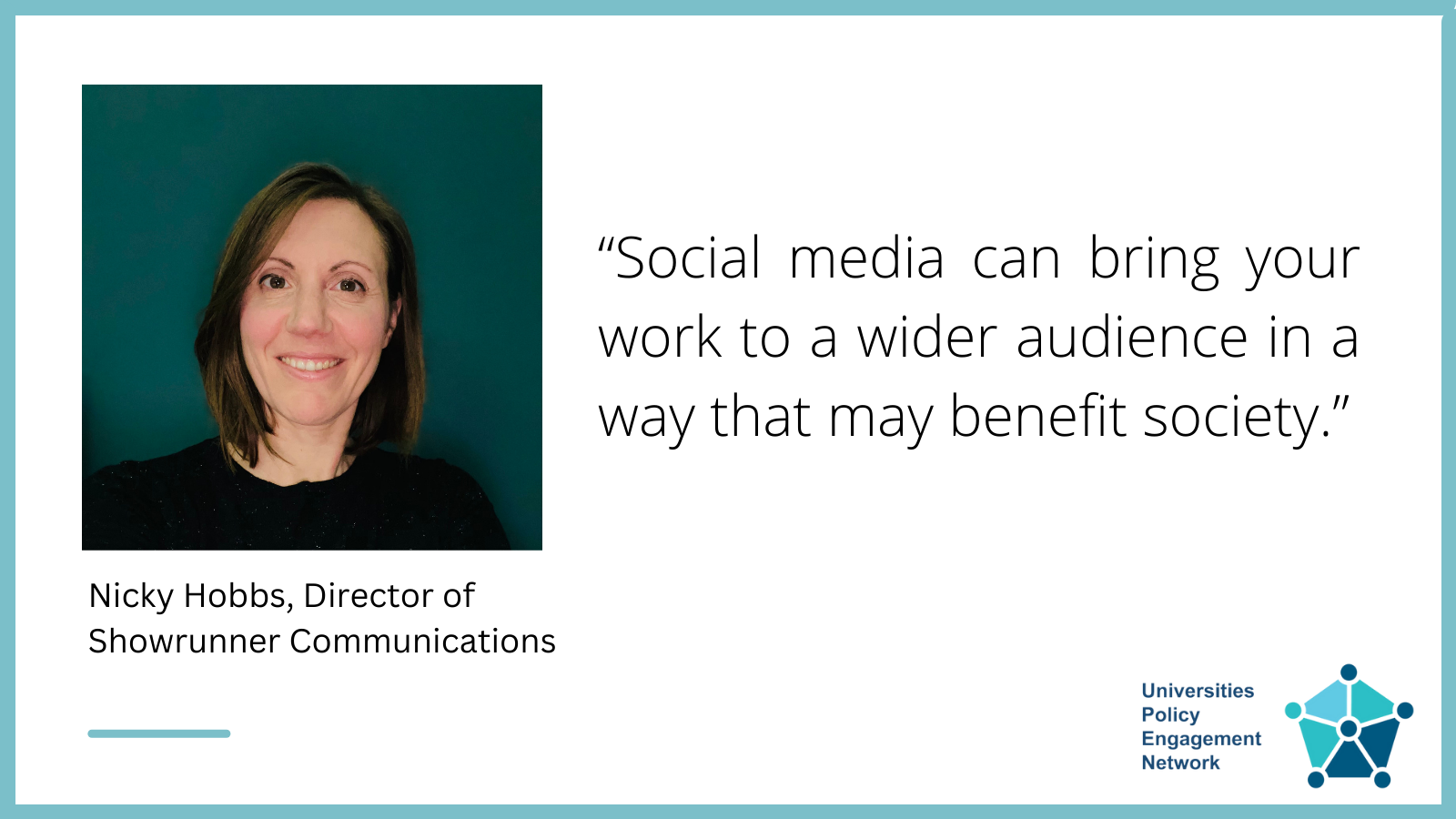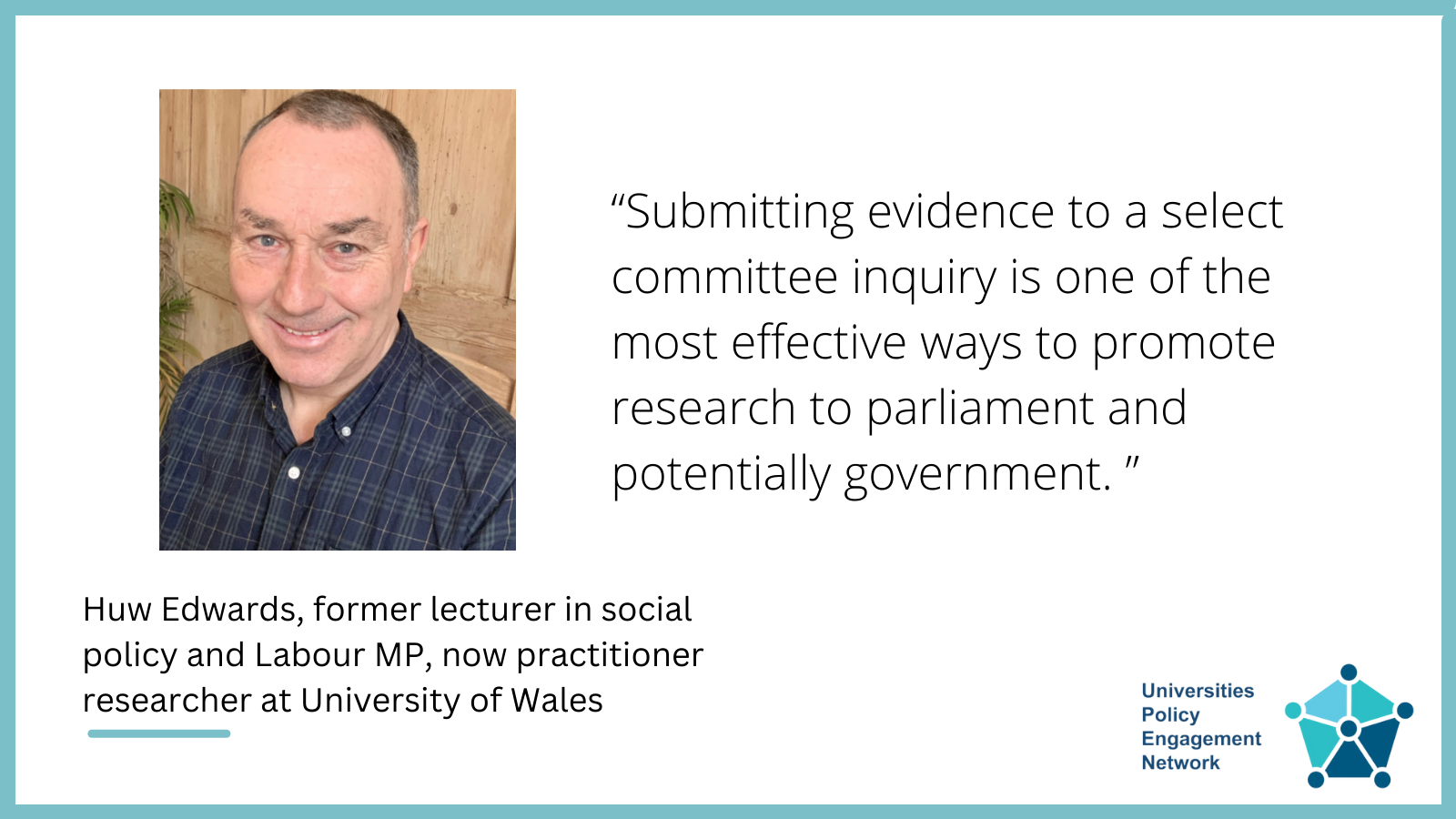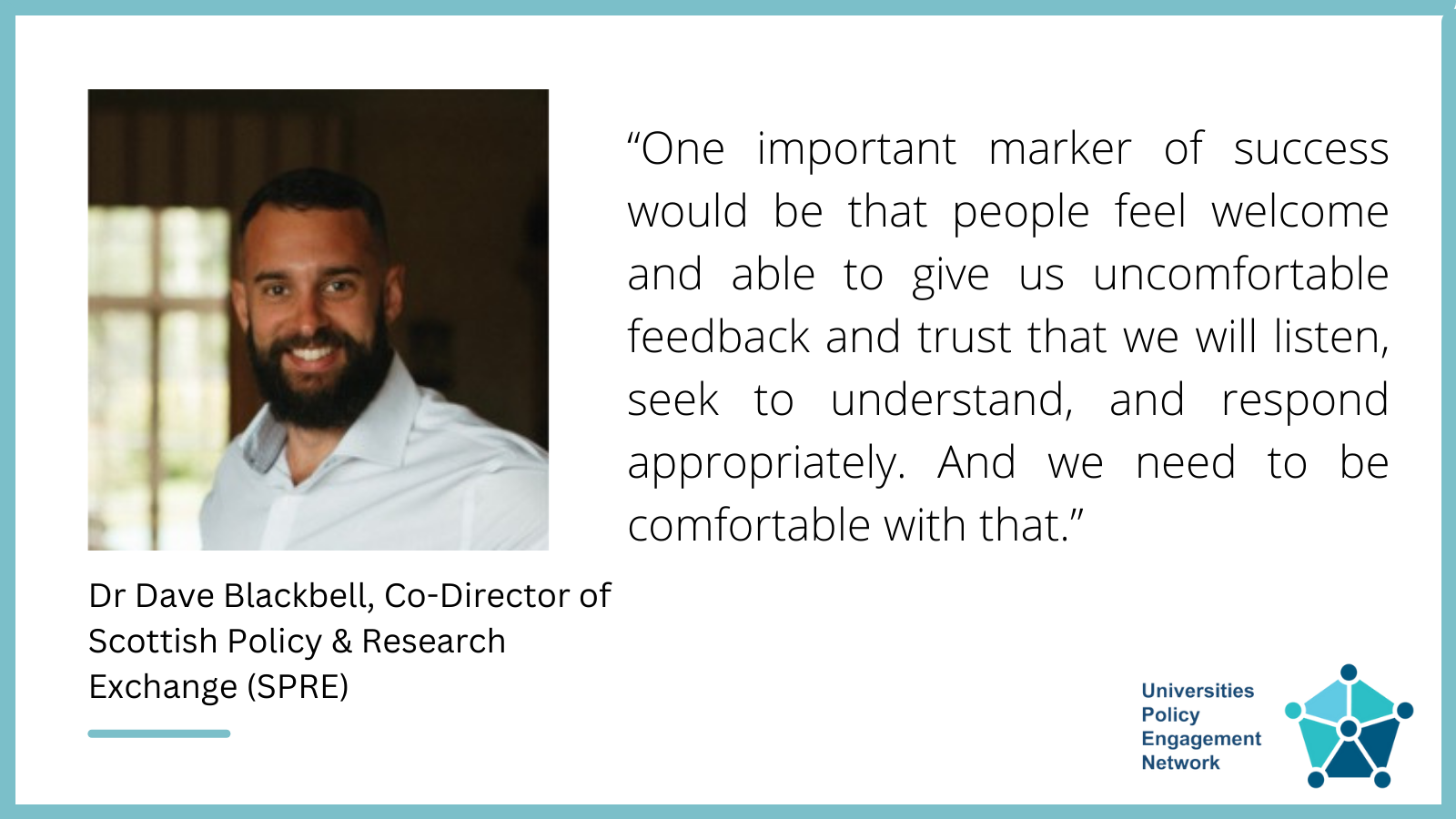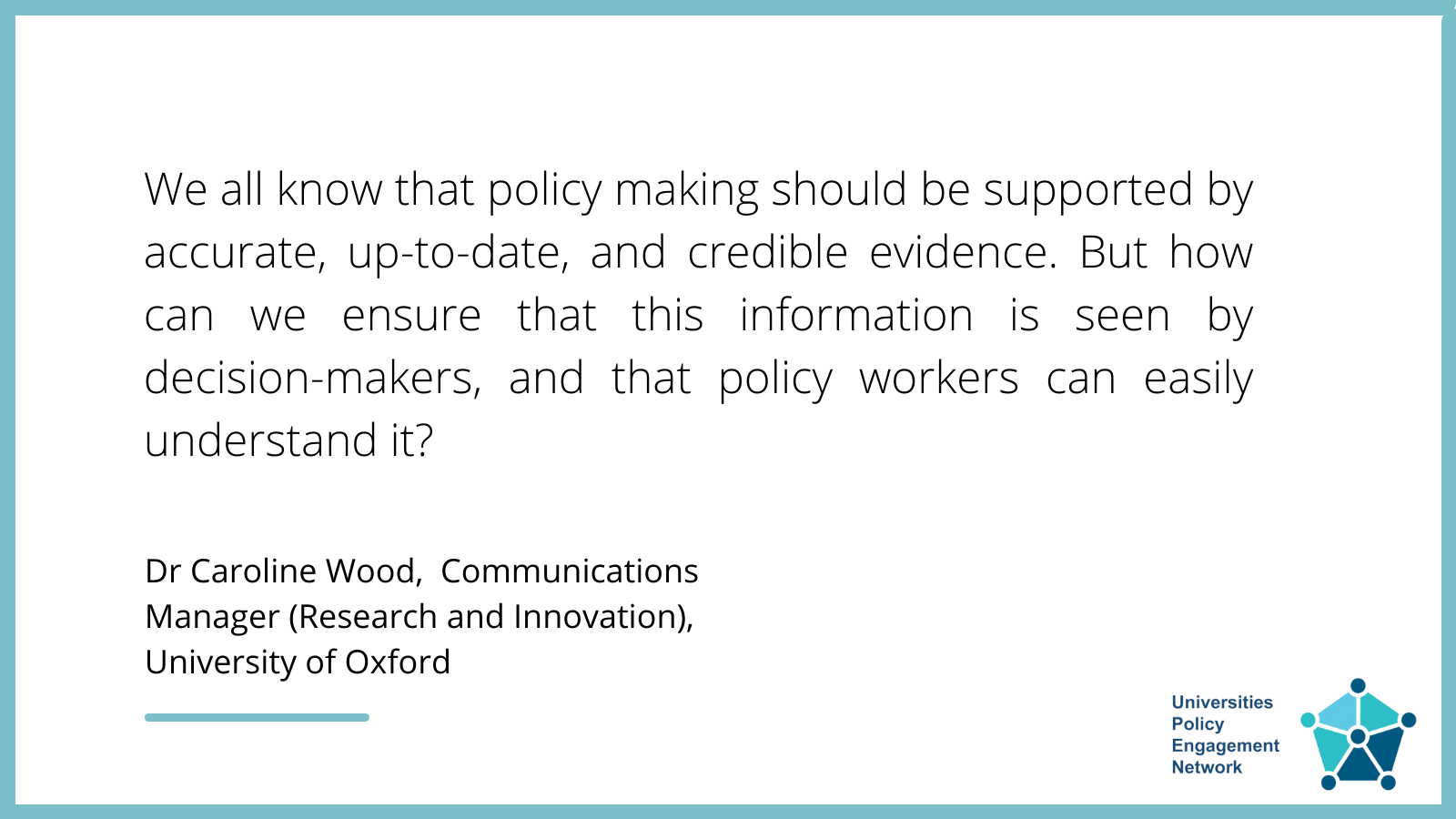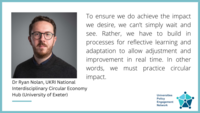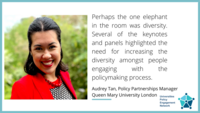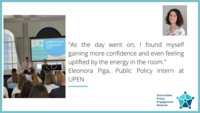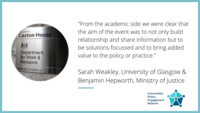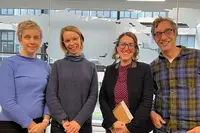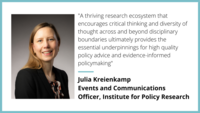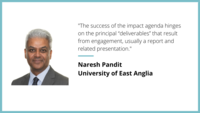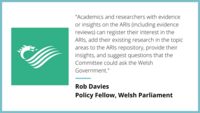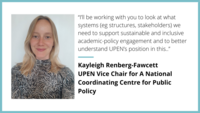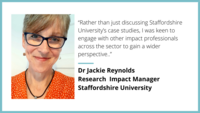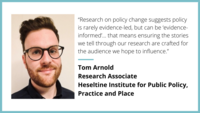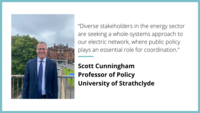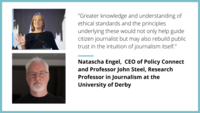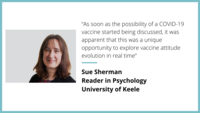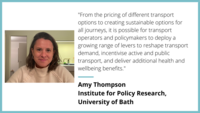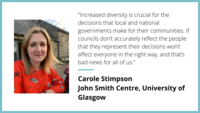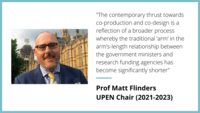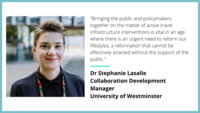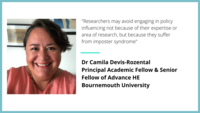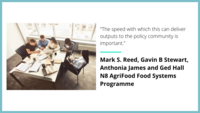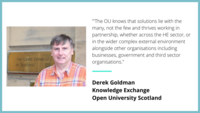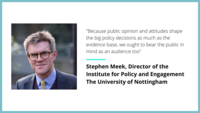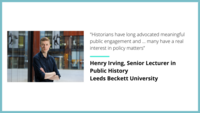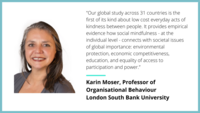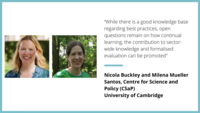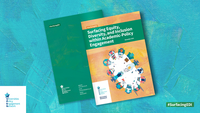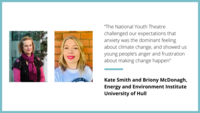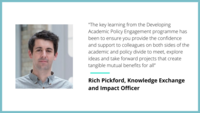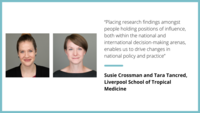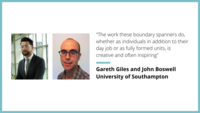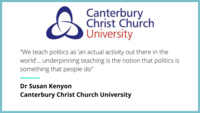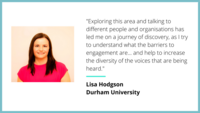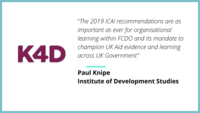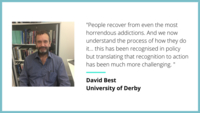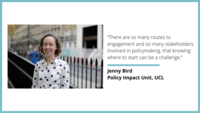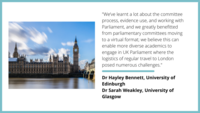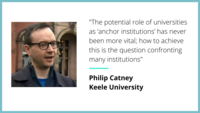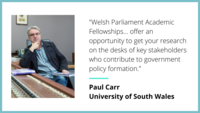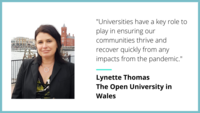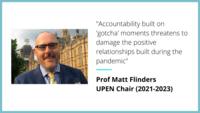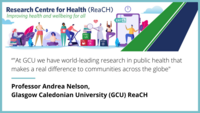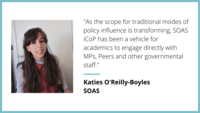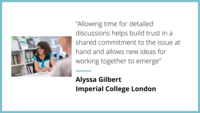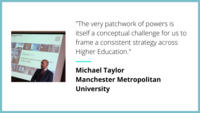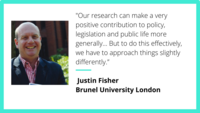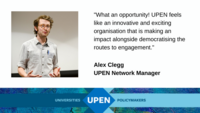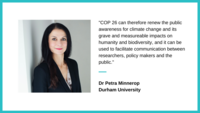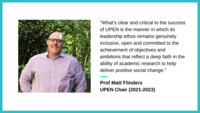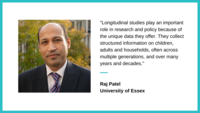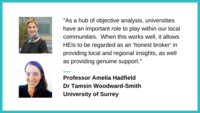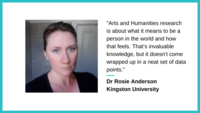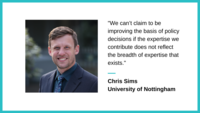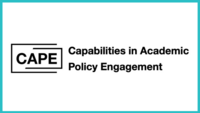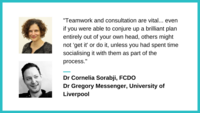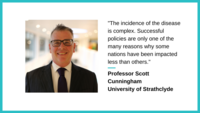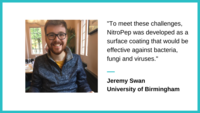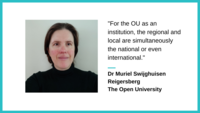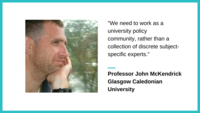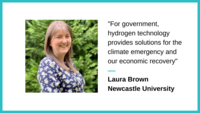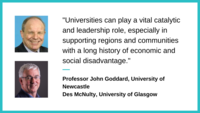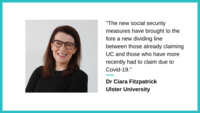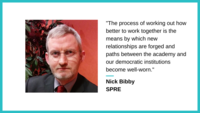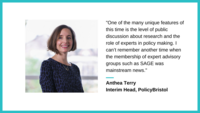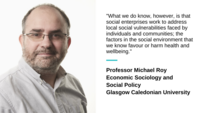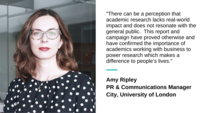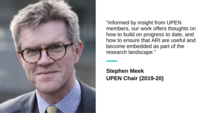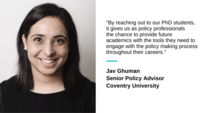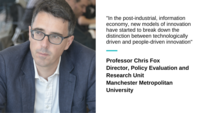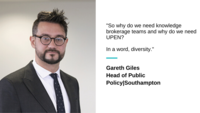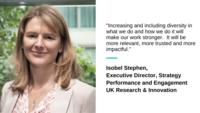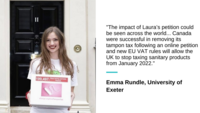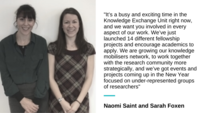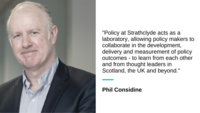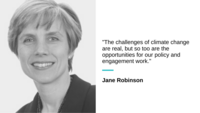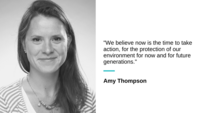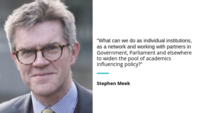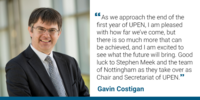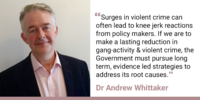Blogs
Posted 2024-04-24 08:31:44 by Ahmad Al-Hiari
Pioneering Policy Engagement at De Montfort University
I am delighted to share with you De Montfort University's (DMU) experience in launching its dedicated Policy Engagement Unit, and to highlight the invaluable support I received from the Universities P...
Posted 2024-04-17 10:45:18 by Raj Patel and Chris Coates
Building an evaluation culture: how researchers can help understand the impact of government policies
Policymakers have ball-park mechanisms to figure out what is ‘going on out there’, but the sure-fire way to be certain whether a policy is achieving its intended outcomes and for whom, is to evalu...
Posted 2024-04-05 11:58:56 by Lisa Hodgson
Welcoming events: Why accessibility matters in event planning
It is well known that there is a lack of diversity when it comes to those who are participating in public policy opportunities. The House of Commons Liaison committee report ‘The Effectiveness and i...
Posted 2024-03-27 11:43:13 by Eleonora Piga
Reflections on my time at UPEN
At last, my time as Comms and Membership Policy Officer for UPEN has come to an end, and it is a bitter-sweet moment for me.The past 9 months have been an incredible learning experience, that has equi...
Posted 2024-03-20 13:36:39 by Dr Kristen Harkness
How a research team turned ‘game designers’ could innovate Parliament’s ability to create evidence-based policy in a national security crisis
The year is 2035. Location, the Arctic. The summer ice sheet has retreated and opened navigable shipping routes, fish stocks have migrated north and are suffering from over-fishing, and the green ener...
Posted 2024-02-21 10:27:24 by Sinéad Murphy
Good evidence is diverse evidence: the case for Areas of Research Interest (ARIs)
See UPEN event 10 Jan 2024:Navigating Government and Parliamentary Areas of Research InterestIt is now well-established by those working in academic-policy engagement that good evidence use requires d...
Posted 2024-02-07 12:49:49 by Grace Gottlieb
Public speaking for a policy audience: Put yourself in the policymaker’s shoes
This blog is from a UPEN and Future Leader Fellow Development Network Masterclass on Public Speaking for a Policy Audience, led by Delia Lloyd, from RealDelia Communications.Imagine you have secured a...
Posted 2024-01-24 13:59:27 by Audrey Tan, Neil Heckels
Submit an expression of interest to join the UPEN Mentorship Programme as a mentor or as a mentee
Want to connect with and learn from policy-engaged peers? UPEN is excited to announce the launch of the second year of the UPEN Mentorship Programme to connect with and support knowledge exchange coll...
Posted 2024-01-11 10:09:09 by Arlene Holmes-Henderson
Building Collaborations between Academics and Policymakers: a focus on Languages
By Arlene Holmes-Henderson, Professor of Classics Education and Public Policy at Durham University and UPEN Vice Chair (Arts and Humanities)A workshop held at the Institute of Languages, Cultures and ...
Posted 2023-12-15 14:41:14 by Professor Arlene Holmes-Henderson
Policy Engagement beyond borders: Strengthening EU-UK collaboration
UPEN Vice Chair Professor Arlene Holmes-Henderson attended an event on 24th November at Cardiff University’s Council Chamber, which brought together researchers and senior representatives from organ...
Posted 2023-12-13 12:04:33 by Roshnee Patel
Advising Under Pressure: a picture to help inform your engagement
Roshnee Patel, Deputy Director at MoJ, talks about who advisers are, what good advice entails and what pressures they navigate, in an attempt to help academics, understand how best to engage in that c...
Posted 2023-12-08 12:57:02 by Dr Angeliki Papadaki
A journey into researching Meals on Wheels: from lack of awareness to building the evidence to influence national policy
When the COVID-19 pandemic began and the first national lockdown started in England, my next-door neighbour was an older woman, who was instructed to shield and not leave her home. I called her after ...
Posted 2023-11-28 13:47:51 by Professor Arlene Holmes-Henderson MBE
Widening the evidence base for policy: experiences and opportunities
This blog provides a report from an event chaired by UPEN Vice-Chair Professor Arlene Holmes-Henderson and hosted by the Policy Profession as part of its annual online Policy Festival (September 2023)...
Posted 2023-11-28 13:49:03 by Professor Arlene Holmes-Henderson MBE
Science for Policy in Europe: reporting from Brussels
By Arlene Holmes-Henderson MBE, Professor of Classics Education and Public Policy at Durham University.In October, I attended the first Science for Policy conference hosted by the EU Science and Innov...
Posted 2023-11-08 11:47:14 by Policy Leeds
An insider’s view on working in science and health policy
*This blog was originally published with Policy Leeds*Whether you want to engage with policy professionals or are thinking of joining them, understanding what a career in policy is like can only be a ...
Posted 2023-10-20 09:41:29 by Andrew Gill
Reflections on party conference season
The party conference “season” is that strange time in the year, usually in the early autumn, when Westminster politics is exported to a selection of northern cities and seaside towns in the south ...
Posted 2023-10-16 11:43:27 by Dr Frances Hamilton and Tahlia-Rose Virdee
Introducing the LGBTQ Travel Tool – An Interactive Policy Development Tool
We are proud to introduce theLGBTQ Travel tool. This electronic toolkit allows employers and Universities to devise specific policy and practice considering LGBTQ student and staff engagement with i...
Posted 2023-10-09 13:27:30 by Prof. Dr. John Oliver
The doors keep opening
Two years ago I wrote a UPEN blog about my Parliamentary Academic Fellowship (PAF) with the Parliamentary Office of Science & Technology (POST). The thrust of the blog was that the fellowship prov...
Posted 2023-09-28 10:31:12 by Dr Camila Devis-Rozental, Principal Academic, Bournemouth University
Supporting doctoral students and early career researchers to develop their socio-emotional intelligence could increase their engagement with policy.
As academics we are increasingly expected to demonstrate an impact from our research to solve world challenges and inform practice. This may mean engaging in public policy. Now, this is not something ...
Posted 2023-09-22 08:49:56 by Tayler Truhan
Lessons learned from the EMPOWER Youth Mental Health seminar
On the 25th August, 2023 we held the EMPOWER seminar at Queen’s University Belfast focusing on youth mental health. My colleagues, Dr. Arianna Prudenzi (Principal Investigator) and Dr. Paul Shuttlew...
Posted 2023-09-19 09:55:28 by Nicky Hobbs
Social media, a powerful way to share your ideas
Do I have to be on social media to raise the profile of my research work and build my reputation?We were delighted to talk about social media with UPEN members at a recent workshop about building prof...
Posted 2023-09-13 09:53:05 by Huw Edwards
Select Committees and Research Impact
Submitting evidence to a select committee inquiry is one of the most effective ways to promote research to parliament and potentially government. The new parliamentary session will see current inquiri...
Posted 2023-09-06 09:27:19 by Dave Blackbell
Recruiting for relational leadership - SPRE's search for a Co-Director
TheScottish Policy & Research Exchange works with research, knowledge mobilisation and policy communities in Scotland, as well as across the UK, to improve how evidence and expertise shapes public...
Posted 2023-08-25 08:52:00 by Caroline Wood
Communicating evidence to policy makers - how can we know what works best?
We all know that policy making should be supported by accurate, up-to-date, and credible evidence. But how can we ensure that this information is seen by decision-makers, and that policy workers can e...
Posted 2023-08-03 16:15:35 by Laura Bea
Ten years of Arts and Humanities Policy Engagement: What has Changed?
Author: Laura Bea, All views are my ownThe UPEN Arts and Humanities Sub-Committee have released a statement, called on by various members, highlighting the complex and tense environment surrounding Ar...
Posted 2023-07-24 10:18:24 by Dr Ryan Nolan
Circular Impact: A Call to Action for Research on Grand Societal Challenges
Ryan Nolan from the UKRI National Interdisciplinary Circular Economy Hub (University of Exeter)—part of the broader NICER Programme working to scale up circular economy capabilities in the UK—disc...
Posted 2023-07-24 10:16:30 by Jen Harrison
REF 2028 – breathing new life into policy impact?
Some of us may still be catching our breath from the last time around, but the starting pistol for REF 2028 has officially been fired.In June, the Future Research Assessment Programme (FRAP) – repre...
Posted 2023-07-20 08:25:53 by Admin
The future of knowledge mobilisation…is bright (if a bit white)
One would think it difficult to match the jubilation of the hoard of Ashes-bound men downing beers on my 8am train to Birmingham, and yet, the atmosphere at the UPEN conference was comparable (minus t...
Posted 2023-07-20 08:23:50 by Admin
The role of networking and relationships in your policy engagement journey
Our 2023 monthly policy events ‘Research and Public Policy: Increasing Impact with Professor Graeme Reid’ had a fantastic grand finale in Belfast this May. This five-part series of in-person event...
Posted 2023-07-14 11:55:56 by Sarah Chaytor and Chris Hewson
The Future of Knowledge Mobilisation: Reflections from the UPEN 2023 Conference
Over the past 5 years, UPEN has grown from a small and convivial group of like-minded people into an extensive community that brings together individuals from over 120 universities and other organisat...
Posted 2023-07-07 09:04:16 by Eleonora Piga
Standing on the shoulders of giants
When I hopped on a train to Birmingham from London at 7.30 am, I assumed that the packed carriages were full of UPEN members sharing my excitement for the Annual Conference at The Exchange. Little did...
Posted 2023-06-28 15:47:55 by Dr Arlene Holmes-Henderson
Reflections on my first UPEN Conference
In this blog, Dr Arlene Holmes-Henderson, Vice-Chair for UPEN (Arts and Humanities) reflects on going to her first UPEN Annual Conference which took place in Birmingham June 2023.
--
My journey t...
Posted 2023-05-31 14:58:34 by Future Leader Fellows Development Network
Using a 360-perspective policy-messaging approach to maximise awareness, interest and action!
This blog is reshared from the Future Leader Fellows Development Network
2023 continues with a strong policy theme with our monthly events ‘Research and Public Policy: Increasing Impact with Pro...
Posted 2023-05-24 12:05:10 by FLFDN
From research evidence to policy change; the long and winding road
Blog reshared from the Future Leader Fellows Development Network
By Sara Shinton, Barry Smith, Helen Freeman and Katie Nicoll Baines
2023 has started with a strong policy theme with two events i...
Posted 2023-05-03 10:34:34 by Sarah Weakley and Ben Hepworth, April 2023
Taking ARIs north of the border
In October 2019 Policy Scotland partnered with the Department of Work and Pensions (DWP) to host an Areas of Research Interest (ARI) engagement workshop. In this blogpost Sarah Weakley (University of ...
Posted 2023-04-19 15:19:55 by Juliet Jopson
Engaging UK Parliament with Climate and Environmental Research
Please note: this article was originally published on Policy Leeds Blog.
High quality research evidence helps UK Parliament holds the Government to account, scrutinise legislation, and hold informe...
Posted 2023-01-24 10:11:13 by Julia Kreienkamp
Advising government: navigating complex and fast-paced policy environments
The important role of research in supporting policymaking is increasingly well recognised. This is evident, for example, in the worldwide proliferation of university-based policy engagement bodies ove...
Posted 2022-12-19 11:45:48 by Luca Mannocchi
Commercialisation and Policy Research
On 27th October 2022, Cambridge Enterprise and the Centre for Science and Policy (CSaP) organised a roundtable discussion involving social sciences researchers, policymakers, representatives from larg...
Posted 2023-07-12 14:11:10 by Louise Corti
Data for Policy: working with data from the Office for National Statistics
In this blog Louise Corti, Head of Analytical Insights and Impact at the SRS, Official for National Statistics (ONS) speaks about how policy impact managers and knowledge brokers can work with ONS to ...
Posted 2022-11-04 10:08:12 by Naresh Pandit
Writing and Presenting Reports for Government: Five Do's and Five Don'ts
Academics are increasingly being encouraged to engage with government policy-making. Academic journals are asking contributors to more clearly and comprehensively state the government policy implicat...
Posted 2022-11-04 10:00:37 by Rob Davies
Enter the dragon: Senedd committees Areas of Research Interest pilot project
In September, two Senedd committees launched the Senedd’s first Areas of Research Interest (ARIs) as a new way to improve committees’ engagement with the research community. ARI topics include cl...
Posted 2022-11-01 14:13:49 by Ben Walmsley
Five steps for engaging policymakers with research
Many academic researchers struggle to engage policymakers with their work. They are often unsure where to start and sometimes feel that any approaches they make might be unwelcome or superfluous.
...
Posted 2022-08-23 09:47:53 by Kayleigh Renberg-Fawcett
Building UPEN's vision for a sustainable academic-policy engagement ecosystem
During my first month as Vice-Chair, which has been spent listening and reflecting with UPEN members, I feel very grateful and hugely excited to have been voted in with a remit of exploring UPEN’s t...
Posted 2022-08-02 12:33:28 by Jackie Reynolds
Policy and Placemaking in REF2021 Impact Case Studies
At Staffordshire University, placemaking – and how we can contribute to it - is a key concern. Our main campus is in the heart of Stoke-on-Trent, a city that is renowned for high levels of deprivati...
Posted 2022-07-19 12:17:58 by Ariana Darvish, Sarah Chaytor and Robyn Parker
Lessons from literature and practice: how to support successful academic-policy engagement
This blog was originally published by CAPE. You can read it on their website here
There has been increasing scholarly investigation of academic-policy engagement in recent years. This has accompan...
Posted 2022-07-01 10:10:52 by Tom Arnold
Engaging with policymakers: learnings and reflections on the Heseltine Institute's policy briefing series
Policy briefings can be effective tools for academics to engage with a wide range of policymakers. In this blog, Tom Arnold of the University of Liverpool’s Heseltine Institute reflects on some of t...
Posted 2022-06-24 08:44:42 by Scott Cunningham
Planning for the Electricity Transmission
This blog post describes the upcoming electricity transition, and the necessity for better planning for our future energy requirements.
I recently worked with ClimateXChange, a policy transfer gr...
Posted 2022-06-28 08:28:32 by Audrey Tan
How universities can embed equality, diversity and inclusion within public policy training offers
Steps higher education institutions can take to make their policy engagement training programmes as diverse and inclusive as possible, based on the experience of a UK university
There is a lot of...
Posted 2022-06-17 09:34:25 by Natascha Engel and John Steel
A code of ethics for citizen journalists
Traditional, legacy journalism operates in a framework of ethical standards. Whether these are the BBC’s Editorial Guidelines, the NUJ’s code of conduct, IPSO’s editors’ code of practice or I...
Posted 2022-06-21 12:02:32 by Sue Sherman
Understanding attitudes towards COVID-19 vaccination before and after vaccine development and rollout.
Dr Sue Sherman reflects on the importance of rapid funding and collaboration for her and her colleagues’ research on attitudes towards COVID-19 vaccination and the impact it had.
How it began
...
Posted 2022-06-17 09:21:58 by Eghosa Ekhator
Real World Change: When Academic Research Informs Policy
Women are still being discriminated against in Nigeria across a range of areas from Labour Laws to Sexual Violence Laws but using this research to inform NGO policy can effect real world change.
...
Posted 2022-06-14 07:32:29 by Amy Thompson
How can the UK accelerate the journey to net zero transport? A headlight look at the German transport decarbonisation approach
Transformation of our transport systems to achieve net zero emissions mobility is one of the many significant challenges we face to avoid the impacts of extreme climate change. Yet transport decarboni...
Posted 2022-06-07 09:36:10 by Carole Stimpson
How do we make politics more attractive for women?
Just over a third of newly-elected Scottish councillors are women, what can we do to make politics a more appealing job prospect?
In May, polling stations opened across Scotland for local elections...
Posted 2022-05-31 12:02:16 by Matthew Flinders
Daring to be a Daniel - Against Policy Impact
In order to contribute to the debate concerning the ‘impact agenda’, in general, and policy engagement, in particular Matthew Flinders challenges what he suggest is the existence of ‘a self-evi...
Posted 2022-05-31 12:13:22 by Matthew Flinders
"What Works" when it comes to Policy Engagement? A question we should be able to answer
But how do researchers know how to engage with policy-makers? Where are the docking points? How might engaging with policy-makers at different levels of government or in different policy areas demand ...
Posted 2022-04-26 12:55:39 by Stephanie Lasalle and Jeeshan Gazi
Engaging the public on active travel policymaking
Bringing the public and policymakers together on the matter of active travel
infrastructure interventions is vital in an age where there is an urgent need to reform our lifestyles; a reformation tha...
Posted 2022-04-25 11:59:58 by Dr Camila Devis-Rozental
How Imposter Syndrome can create barriers to academic-policy engagement
Dr Camila Devis-Rozental reflects on how imposter syndrome can create barriers for researchers wanting to engage in policy impact.
Is imposter syndrome getting in the way of sharing your knowled...
Posted 2022-03-15 11:28:05 by Mark S. Reed, Gavin B Stewart, Anthonia James and Ged Hall
A new way to synthesise evidence for policy for a fraction of the time and cost of a traditional systematic review, while giving Early Career Researchers a skill, paper and impact
In this blog, Mark Reed, Gavin Stewart, Anthonia James and Ged Hall describe a programme that delivered evidence syntheses and policy briefs for a fraction of the cost of a typical systematic review,...
Posted 2022-03-11 13:18:12 by Jessie Simkiss
What do policymakers want from the humanities?
Jessie Simkiss reflects on an event co-hosted by Oxford and UPEN last year which asked, ‘What do UK policymakers want from the humanities?’
Science advice for policy
When it comes to pol...
Posted 2022-02-22 11:26:28 by Derek Goldman
Working in partnership to influence policy. Insights from The Open University in Scotland
The Open University is a unique player in the Higher Education environment, and builds on its partnerships to engage policy makers and the policy agenda
The Open University (OU) is a four nations u...
Posted 2022-02-15 11:29:47 by Olayinka Ajala
Understanding the link between climate change, conflict and internal displacement: Engaging policymakers in Sub-Saharan Africa
In the last few decades, there has been an increase in migration and displacement in several countries in Sub-Saharan Africa (SSA). While the focus has been on migration across the Sahara and subseque...
Posted 2022-02-08 14:59:38 by Matt Flinders, UPEN Chair
Are You Ready? The UPEN Annual Conference and Lecture 2022
If the Covid-19 pandemic has shown anything it’s the importance of being able to work across the research-policy interface in an agile and efficient manner. Beyond the pandemic response, policy-make...
Posted 2023-07-12 14:13:15 by Jules Pretty
Can Public Engagement Improve Lives?
Types of public engagement matter if we wish to improve livesThe purpose of Public Engagement (PE) in universities is to ensure research and education leads to improvements in people’s lives. An eng...
Posted 2022-02-01 10:00:42 by Stephen Meek
Policy Impact and Public Engagement - Two Sides of the Coin?
In a blog I wrote for Wonkhe to coincide with the launch of the University of Nottingham’s Institute for Policy and Engagement back in October 2019 (hard to imagine that we had an actual, physical l...
Posted 2022-01-18 11:04:38 by Henry Irving
Bringing More History into Policy
Dr Henry Irving, Senior Lecturer in Public History at Leeds Beckett University, reflects on how to bring more historical expertise into policymaking.
Here is a fun experiment. Open Google in a new ...
Posted 2022-01-11 10:09:33 by Karin Moser
Social mindfulness matters - for all of us. What may sound like an esoteric new year's resolution is actually at the core of the social fabric of our society, new behavioural research shows
This research tried to address some of the biggest challenges in my field of social psychology and behavioural science: connecting individual behaviours with large scale political and societal develop...
Posted 2021-12-14 15:29:45 by Nicola Buckley and Milena Mueller Santos
Incoming Policy Fellowships - Best Practice and Open Questions
Incoming Policy Fellowships are one example of academic-policy engagement fellowship schemes. They can be effective ways for promoting knowledge exchange, networking, and professional development. T...
Posted 2021-12-08 07:39:18 by Kathryn Watson
UPEN Report Launch: Meeting the challenge of creating a more inclusive approach to academic-policy engagement
How do academics become involved in engagement with policy makers? Why do some people have close policy connections and others seem to be left out in the cold? Are the right voices represented in po...
Posted 2021-11-30 10:43:01 by Kate Smith and Briony McDonagh
The rewards of letting go: putting young people's voices centre-stage at COP26
In a ground-breaking Knowledge Exchange collaboration between academics and young creatives, researchers from the University of Hull have been working with the National Youth Theatre to create a power...
Posted 2021-11-23 10:45:32 by Rich Pickford
Dispelling Apprehension and Promoting Energy for academics to work with policymakers
How do you get colleagues to recognise their broad skills and knowledge based and to translate it beyond academia?
That was the question on my mind whilst I was exchanging a flurry of emails abou...
Posted 2021-11-16 11:58:20 by Dr Sin'ad Furey
Academic-Policy Engagement: Representing the voices of others
Against a backdrop of escalating food insecurity in the United Kingdom, my research policy engagement work has strategically positioned me to advocate effectively and meaningfully for those experts by...
Posted 2021-11-09 15:51:37 by Phil Ward
The importance of underlying evidence for policy engagement
Before we engage actively with policymakers and politicians, we need to understand our own position. What’s our starting point? How have contemporary issues and events affected our work? What polici...
Posted 2021-10-26 13:37:22 by Susie Crossman and Tara Tancred
How to engage and involve policymakers in research
At the onset of a research project or programme, engaging with policymakers can be a daunting challenge. But careful planning at the research proposal writing stage and nourishing strategic partnersh...
Posted 2021-10-19 13:57:13 by Dr Marie Claire Brisbois
COP26: the role of research and time for action?
The 26th annual United Nations Climate Change Conference starts in less than ten days. Each COP is an opportunity for world leaders to come together to jointly address climate change. Dr Marie Claire...
Posted 2021-10-12 10:40:08 by Nishan Canagarajah
Change is a Kaleidoscope of Colour
Professor Nishan Canagarajah explains why it is vital to drive forward EDI initiatives in HE in order to influence change both outside and within universities.It’s Black History Month - a time to ce...
Posted 2021-10-07 15:13:09 by John Boswell & Gareth Giles
Lighting the way? Helping knowledge brokers span the space between evidence and policy
Dr John Boswell and Gareth Giles from the University of Southampton explore the role of the 'boundary spanner' in academic policy engagement.
Emerging research on the evidence-policy interface poin...
Posted 2021-10-05 10:57:32 by Dr Susan Kenyon
Teaching students how to influence policy and engage with stakeholders at Canterbury Christ Church University
UPEN is doing valuable work in opening up policymaking to academics. In Politics and International Relations at Canterbury Christ Church University (CCCU), we are working to open up policymaking to...
Posted 2021-09-28 10:14:27 by Lisa Hodgson
Not Just an issue for policy engagement - my ED&I journey
Read Lisa's journey as she tries to understand the complex issues around the diversity in contributions to public policy initiatives and the importance of Parliaments and Governments in hearing from m...
Posted 2021-09-22 09:28:08 by Joanna Howard, Paul Knipe, Neringa Collier and Kerry Millington
Evidence and learning for development impact - what works? K4D: a model for effective evidence and learning
The UK Aid sector has faced unprecedented challenges over the last 18 months due to the global Covid-19 pandemic, reduction in funding, and shake up of the politics and policy driving development. Con...
Posted 2021-09-08 07:42:39 by John Oliver
Opening doors I never knew existed!
Reflections on an Academic Fellowship with the Parliamentary Office of Science & Technology (POST).
My Academic Fellowship with POST provided a unique opportunity to work with a range of teams an...
Posted 2021-08-18 10:06:30 by David Best
Increasing the focus on peer recovery and empowerment in drug policy
People recover from even the most horrendous addictions. And we now understand the process of how they do it. CHIME – (positive) Connections generate Hope that creates a virtuous circle of a new an...
Posted 2021-08-18 09:43:37 by Sean O'Connor
Avoiding 'groupthink' in policy making
The former Head of Global Projects and Policy at Queen Mary University of London reflects on a career in academic-policy engagement and the benefits of avoiding 'group think'
The timing of this b...
Posted 2021-08-03 10:24:48 by Jenny Bird
Avoiding one-size-fits-all: a tool for tailoring policy engagement
How can policy intermediaries help researchers to take a more strategic approach to policy engagement? Jenny Bird shares one idea that might help avoid a one-size-fits-all approach to policy engageme...
Posted 2021-07-26 15:03:05 by Nathalie Goodsir and Simon Russell
Levelling-up: using the language of the government to maximise policy engagement opportunities
The levelling-up agenda is central to current government policy. This blog considers how researchers can make the most of this.
Though it began as yet another snappy campaign slogan, it is clear ...
Posted 2021-07-23 12:52:37 by Dr Hayley Bennett and Dr Sarah Weakly
Probing the Patchwork of Welfare Services in Scotland: The Experience as Specialist Advisors to a UK Parliamentary Committee
In this blog Dr Hayley Bennett (University of Edinburgh) and Dr Sarah Weakley (University of Glasgow and Policy Scotland), reflect on their work supporting a Parliamentary inquiry into multi-level...
Posted 2021-07-16 10:59:15 by Phil McGowan
Protecting global biodiversity through UK academic engagement
Conservation of biodiversity is one of the most prominent issues of our age. A major UN report published in September considered that humanity was at a crossroads in our relationship with nature, and...
Posted 2021-07-16 10:20:27 by Philip Catney
The role of universities in leveraging local change
Universities need to remember that the projects that they develop are not just demonstrating that projects are feasible at a technical or economic scale but are sensitive to the needs of the communit...
Posted 2021-07-06 16:45:42 by Liz Fawcett
How can more academics be encouraged to engage with Parliament?
Efforts are being made at Westminster to open up the UK Parliament to a wider range of public voices, including a more representative selection of academic researchers. So what can universities and P...
Posted 2021-06-23 08:15:28 by Ben Coleman, Chris Wyatt and Jo Mills
Influencing, Engaging, and Adding Value: Impact and Innovation at the University of Wolverhampton
At the University of Wolverhampton, we are passionate about making a positive impact on our students, our local community and beyond.
From pioneering research into brain tumours to shopping habi...
Posted 2021-06-08 08:36:43 by Paul Carr and Donna Szuran
Welsh Parliament Academic Fellowship: influencing policy to support post Covid-19 music industries in Wales
Welsh Parliament Academic Fellowships give researchers an important voice in policymaking and offer an opportunity to get your research on the desks of key stakeholders who contribute to government p...
Posted 2021-06-01 15:47:22 by Lynnette Thomas
How to embed sustainable development in universities in Wales
Sustainable development is core to Welsh universities’ civic mission and the new Civic Mission Framework supports universities to demonstrate their actions for the purpose of promoting or improving...
Posted 2021-05-28 12:04:08 by Matt Flinders
Blame games: how can blossoming policy-research relations survive the COVID-19 recriminations?
The fact that public accountability generally comes cloaked in a ‘Gotcha!’ mentality threatens the spirit of collaboration that has developed during the pandemic. Matthew Flinders asks how to ens...
Posted 2021-05-26 11:24:09 by Tomas van den Broeke
How Can We Realize Evidence Based Politics?
Never before in modern history has there been a stronger demonstration of evidence based politics than in the current Covid-19 situation. The pandemic delivers the right momentum in the policy and po...
Posted 2021-05-18 09:16:57 by Michelle Ierna
ReaCHing out in response to COVID-19
The mission of the recently launched Research Centre for Health (ReaCH) at Glasgow Caledonian University (GCU) is to reach out to communities to make a positive difference to the quality of people’...
Posted 2021-05-11 08:45:03 by Katie O'Reilly-Boyles
Influencing the Corridors of Power: A Direct Vehicle between academic staff and Westminster
Katie examines the importance of having a concise and direct vehicle for policy engagement between SOAS academics and Westminster.
Amidst the tendency of the UK government to use special advisers...
Posted 2021-05-05 13:22:03 by Alyssa Gilbert
Bringing evidence to policy on the UN Climate Conference
As the COP26 climate summit draws nearer, Alyssa Gilbert from the Grantham Institute at Imperial College London explores how the COP26 Universities Network builds relationships between academics and ...
Posted 2021-05-04 09:23:00 by Michael Taylor
A new King or Queen of the North - Mayors and their networks
On the eve of the Local and Combined Authority Mayoral elections in the UK, Michael Taylor at Manchester Metropolitan University looks at the role Metro Mayors play and how universities can engage wi...
Posted 2021-05-04 09:00:49 by Matt Flinders and Sarah Chaytor
Lost in (the third) space: knowledge brokers need career paths too
Those who blur the lines between academic and professional staff are the connective tissue in the research ecosystem, say Matthew Flinders and Sarah Chaytor
One of the most impressive elements of...
Posted 2021-04-27 14:55:44 by Justin Fisher
Tips for influencing policy: Why it requires a slightly different way of working
Justin Fisher is Professor of Political Science and Director of Brunel Public Policy at Brunel University London. In this blog he looks at how engaging with policy-makers and legislators is hugely re...
Posted 2021-04-21 11:49:47 by Kayleigh Renberg-Fawcett
Introducing the new UPEN Network Manager - Alex Clegg
As UPEN transitions to the University of Sheffield, UPEN welcomes the new network manager, Alex Clegg, to the team! Alex joined UPEN on the 12th of April on three-days a week (Monday-Wednesday). We ca...
Posted 2021-03-31 10:16:34 by Professor Neil Crosby and Dr Ruth Pugh, University of Reading
Navigating the industry route for successful policy engagement
When considering how research can inform policy, the challenge is to understand the myriad of different routes of engagement.
Research engagement by the Department of Real Estate and Planning at t...
Posted 2021-01-25 14:20:16 by Professor Annette Boaz and Dr Kathryn Oliver, ESRC Government Office for Science ARI Fellows
Building new bridges between research and policy during a national lockdown
Annette Boaz and Kathryn Oliver are social scientists with expertise in production and use of evidence for, policy. In this blogpost, they reflect on their recent experiences putting their knowledge ...
Posted 2021-02-16 09:55:43 by Gloria Mensah, University of Sheffield
Why scientists should think like policymakers
In this interview, Grantham Scholar Gloria Mensah explains why scientists (and engineers) should think like policy makers. Further she explains how her research into the rise and fall of CCUS on the U...
Posted 2021-02-09 18:30:19 by Dr Nicola Caroll and Camilla McCartney, University of Leeds
Optimising civic collaboration in Leeds
Nicola Carroll and Camilla McCartney of Leeds Social Sciences Institute discuss how a review of collaboration between academics at the University of Leeds and officers at Leeds City Council is inform...
Posted 2021-01-26 13:31:14 by Alice Millington, Centre for Science and Policy, University of Cambridge
Policy development for organisational resilience
The University of Cambridge’s Alice Millington reviews the insights into resilience shared by Policy Fellows of the Centre for Science and Policy.
The Centre for Science and Policy (CSaP) in Cam...
Posted 2021-01-20 18:19:10 by Dr Petra Minnerop, Durham University
Creating a climate of engagement at a critical juncture
Durham University's Dr Petra Minnerop discuses the importance of policy and public engagement, within and across states, in the lead up to COP 26.
The 26th Conference of Parties under the United N...
Posted 2021-01-12 13:56:42 by Prof Dan Stevens, Prof Susan Banducci, Dr Lazlo Horvath and Dr Andrew Jones
Identity, Inequality and the Media in Brexit COVID-19 Britain
The research team of Identity, Inequality and the Media in Brexit-Covid-19 Britain reflect on the impact Brexit and the Covid-19 pandemic are having on inequalities in Britain.
Brexit and the Covid...
Posted 2021-01-05 10:58:36 by Dr Noel Longhurst and Richard Clarke, University of East Anglia
The Norwich Good Economy Commission
The Norwich Good Economy Commission is a new two-year collaborative project through which the University of East Anglia and Norwich City Council are creating the space to explore what a good city econ...
Posted 2020-12-14 11:24:43 by Dr Arlene Holmes-Henderson, University of Oxford
Engaging with policymakers as a researcher in the Arts and Humanities: a guide to how, what and why
Dr Arlene Holmes-Henderson is a Classicist at the University of Oxford where she leads a project which investigates the impact of learning Classical languages on children’s cognitive development.
...
Posted 2020-12-16 16:08:40 by Dr Helen Manchester, Dr Ola Michalec and Professor Morag McDermont, University of Bristol
Academic perspectives on civic engagement: case studies from the University of Bristol
In this blog, three academics from the University of Bristol share their experiences of civic engagement in 2020, outlining their perspectives on what went well, barriers they faced and their hopes fo...
Posted 2020-12-15 12:18:06 by Matt Francis, Public Affairs Manager, University of Stirling
Increasing capacity for policy engagement through training and partnership
Matt Francis, Public Affairs Manager, reflects on the development of policy engagement activity at the University of Stirling.
November 2020 marked three years since I joined the University of S...
Posted 2020-12-10 09:21:30 by Dr Andy Mycock, University of Huddersfield
The "West Yorkshire Way" to policy engagement: Place-Based Economic Recovery Network (PERN)
The University of Huddersfield's Andy Mycock discusses place-based policy engagement as the region looks to elect its first metro mayor in May 2021.Over the past decade, the UK government has sought t...
Posted 2020-12-07 12:59:35 by Professor Marion Campbell, Vice-Principal for Research, University of Aberdeen
Communicating the importance of the higher education sector through the pandemic
The University of Aberdeen's Vice-Principal for Research reflects on the role of Universities, and specifically the University of Aberdeen, during the pandemic.
Universities across the UK have bee...
Posted 2020-12-07 10:36:05 by Prof Matt Flinders, UPEN Chair 2021-2023
University Policy Engagement: Looking forward to 2021 (and beyond)
UPEN's upcoming Chair (2021-2023) reflects on the role of UPEN and it's priorities going forward.
There’s little doubt that 2020 was, from a number of perspectives, an incredibly challenging ye...
Posted 2020-11-30 10:57:01 by Raj Patel, University of Essex
Challenging social problems: how longitudinal studies can make a difference
In this post, Raj Patel outlines three types of challenging problems and argues that longitudinal studies can play an important role in addressing them.
Many social policies can be difficult to for...
Posted 2020-11-26 09:38:54 by Alice Taylor, Wales Institute of Social and Economic Research and Data
Continuity in a crisis: how WISERD's relationships enabled research on young people's learning in lockdown
The Wales Institute of Social and Economic Research and Data demonstrates how strong relationships with the education sector in Wales helped researchers understand young people’s experience of learn...
Posted 2020-11-17 13:02:44 by Euan Adie, Founder of Overton.io
Policy impact has too many stories and not enough data
Euan Adie, founder of Overton.io, discusses how the platform can help universities measure and track the policy impact of their research.
It's important to strike the right balance in research ass...
Posted 2020-11-17 16:56:04 by Professor Dan Parsons and Louise Smith, University of Hull
The beating heart of the Government's green industrial revolution
The University of Hull reflect on how The Humber is paving the way for the UK's green industrial revolution - through harnessing its research excellence, strategic location and engagements with indus...
Posted 2020-11-16 09:48:37 by Dr Sandra Messenger and Dr Sarah Foxen, Parliamentary Office of Science and Technology
The future of digital Knowledge Exchange between researchers and Parliament
Are you a researcher or do you support knowledge exchange at your university? The Parliamentary Office of Science and Technology are seeking your views on the use of digital communications in knowled...
Posted 2020-11-11 14:36:45 by Dr Shonagh McEwan and Dr Madeleine Beveridge, University of Edinburgh
Engaging with policymakers internationally
In this blog, the Knowledge Exchange and Impact Team from the University of Edinburgh share learning and discussion points from an internal learning event on Engaging with Policymakers Internationally...
Posted 2020-11-10 18:14:45 by Amy Ripley, PR and Communications Manager, City, University of London
City researchers: NHS contact tracing app can be a success if linked to testing
The government’s beleaguered Covid-19 NHS app hit the headlines again recently after the Sunday Times revealed exclusively that it failed to send alerts to thousands of people to tell them to self-i...
Posted 2020-11-09 15:00:19 by Rich Pickford, Nottingham Civic Exchange, Nottingham Trent University
Playing our part against Covid: a love letter to collaborative colleagues
Rich Pickford, Knowledge Exchange and Impact Officer, draws on lessons learned from Nottingham Trent University's continuing work with the C19 National Foresight Group.
Last March I was asked if...
Posted 2020-11-02 15:31:42 by Dr Sonali Nag, University of Oxford and Archana Ganesh Raaj and Gideon Arulmani, The Promise Foundation
Change needs everyone to learn something new: a view from India's classrooms
The authors reflect on India's new National Education Policy, what this means for young children, and the new ways of learning required to ensure it's success.
“If I am to run my daily lessons t...
Posted 2020-11-02 13:09:21 by Professor Chris Fox, Manchester Metropolitan University
How foresight and futures thinking can play a role in developing a radical new policy agenda
In order to address the complex issues of today, Manchester Metropolitan University's Policy Evaluation and Research Unit Director, Professor Chris Fox, suggests that futures thinking should be at th...
Posted 2020-10-28 10:52:03 by Professor Amelia Hadfield and Dr Tamsin Woodward-Smith, University of Surrey
Covid-19 recovery: collaborative civic engagement in Surrey
The University of Surrey discuss how they've collaborated with Surrey County Council and other regional Higher Education Institutions to develop a Covid recovery plan for the region.
November 2020 ...
Posted 2020-10-21 10:51:20 by Rosie Anderson, Impact Development Manager, Kingston University
Making room for Arts and Humanities in policy
Kingston University reflect on the GO-Science Covid-19 ARI call, and why there was less engagement from the Arts and Humanities than other disciplines.
Disruption is one of those buzzwords that s...
Posted 2020-10-22 10:31:52 by Zoe Russell, London School of Economics
Changing behaviours and rebuilding economies: The vital role of social sciences in tackling COVID-19
The London School of Economics discuss how they've supported vital coronavirus-related research in the social sciences to better inform policy.
The public narrative around COVID-19 is dominated by...
Posted 2020-10-19 13:34:59 by Dr Louise Rutt, Impact and Knowledge Exchange Manager, University of Plymouth
Generating policy impact through civic engagement
How the University of Plymouth supports academic engagement with civic partners to generate a culture of policy impact.
Like many HEIs, in our institution we can readily point to numerous examples...
Posted 2020-10-12 14:16:54 by Chris Sims, Head of Policy, Institute for Policy and Engagement
Equality of voice in policy impact: seizing the pandemic moment
How the pandemic is bringing equality questions to the foreground in academic-policy engagement.
For those of us working at the interface of research and policy, these are challenging times. Like ...
Posted 2020-09-28 10:24:04 by Capabilities in Academic and Policy Engagement
Delving under the hood of academic-policy engagement
How do we know if academic-policy mechanisms are working? And what can be done to ensure thatknowledge exchange brokers are valued in the process? CAPE outline their thoughts below.
Knowledge Exc...
Posted 2020-10-05 10:06:16 by Yaryna Basystyuk, Senior Policy Officer, Public Policy | Southampton
Trust, empathy and communication - a toolkit for better collaboration with local government
Public | Policy Southampton outline how a project on climate change and behavioural insights with their local authority was a success.
When I joined academia in 2016, I was incredibly inspired by...
Posted 2020-09-28 09:43:13 by Cornelia Sorabji, Foreign Commonwealth and Development Office and Gregory Messenger, University of Liverpool
Trading places
What happens when a civil servant and an academic trade places?
Gregory Messenger (University of Liverpool) just spent two years part-time as a knowledge exchange fellow working on trade law and p...
Posted 2020-09-21 10:53:01 by Professor Scott Cunningham, University of Strathclyde
Government strategies and international response to the Coronavirus
In this piece I’ll draw upon international comparisons to better understand how different nations have addressed the challenges of coronavirus.
I’ll also take a look at the timing of various p...
Posted 2020-09-21 10:38:30 by Jeremy Swan, Public Affairs Manager, University of Birmingham
Preventing the spread of infection through contaminated surfaces
What made you want to work in higher education?
For me, it was the great experience I had as a student in Liverpool and the recognition that going to university can have a transformative effect on...
Posted 2020-09-15 11:56:53 by Dr Muriel Swijghuisen Reigersberg, Senior Research and Knowledge Exchange Impact Manager, The Open University
The Open University: Combining national policies with local strengths across the UK Nations
As an institution which has a presence in all the Nations, The Open University has unique opportunities to engage with policy makers across the UK as part of its knowledge exchange and impact portfoli...
Posted 2020-09-14 09:48:23 by Professor John McKendrick, Co-Director, Scottish Poverty and Inequality Research Unit
Why should anyone listen to us?
UPEN’s mission is admirable, but it also has the potential to be truly transformative.
Who is ‘us’
I want to think about the UPEN network, my department/institution and my research unit. ...
Posted 2020-08-31 10:04:33 by Dr Ray Kent, Director of Research and Innovation Services, Royal Veterinary College
Prevention is better than cure: avoiding future pandemics
Over the course of this year, pathogens that have crossed the species barrier from animals to humans – so-called ‘zoonotic’ diseases – have moved from relative obscurity to centre-stage in the...
Posted 2020-08-26 09:04:27 by Ben Hepworth, Ministry of Justice
Navigating the seas of knowledge exchange
In his essay, ‘On justice, and how to know it is there’, the sociologist Zygmunt Bauman remarked: “It is in times of crisis that the routine, daily, perpetual and habitual distribution of privil...
Posted 2020-08-14 08:40:11 by Dr Simon Brooks, Morgan Academy, Swansea University
Resilience, agility and value-based health care
There could hardly be a more apposite time to be talking about resilience.
The Covid-19 pandemic has brought to the fore the need for individual resilience, societal resilience and organisational...
Posted 2020-08-11 08:03:23 by Laura Brown, Newcastle University
Harnessing hydrogen fuel for a green and industrial recovery
As the UK looks toward its economic recovery from the impacts of Covid-19, there is a real and urgent need to build a greener economy. By harnessing the potential of hydrogen fuel, we can drive innov...
Posted 2020-07-23 10:03:13 by Kayleigh Renberg-Fawcett, UPEN
How UPEN can support Universities and Government's Areas of Research Interest
Following the recommendation of the Sir Paul Nurse review in 2014, the UK Government launched an innovative mechanism to make it clearer to the outside world what their long-term thinking is, and what...
Posted 2020-07-09 17:07:15 by Dr Chris Foulds, Anglia Ruskin University
Energy-PIECES: providing policy secondments for early career researchers
Policy has focused on gathering evidence and insights from the more technical disciplines. Social Sciences and Humanities (SSH) research has often been overlooked as an evidence base, especially withi...
Posted 2020-07-06 11:05:43 by Professor John Goddard and Des McNulty
Universities and the recovery of local communities from the Covid-19 Crisis: A role for the social sciences
While universities face major challenges to their funding and business models as a result of COVID-19, many are nevertheless deepening connections and collaborations with the NHS, local authorities, b...
Posted 2020-06-29 16:35:19 by Dr Rachel Ramsey, University of Sunderland
Awkward sandwiches and melting snowballs
Snowball effects have great value in policy influence.
For example, one conversation between an academic and policymaker can raise the academic’s profile in the policymaker’s mind. If they fin...
Posted 2020-06-22 15:40:34 by George Hope, The Forum lead, Imperial College London
Imperial College London's The Forum: Policy engagement during the pandemic
The Forum, Imperial’s policy engagement programme, connects Imperial researchers with policymakers. This has been no different during the lockdown and The Forum has been helping researchers to ensur...
Posted 2020-06-10 10:31:00 by Dr Camila Caiado, Professor Brian Castellani and Neil Heckels, Durham University
Applying research to the Covid response: how Durham University modelling is helping local planning
As many of the recent posts at UPEN have articulated, COVID-19 presents universities with a number of challenges regarding their civic responsibilities and contributions.
Like many institutions, Du...
Posted 2020-06-01 11:22:06 by Dr Ciara Fitzpatrick, Ulster University, School of Law
Social Security and COVID-19: An inadequate response to crisis
Lockdown due to the Covid-19 global pandemic has had far reaching consequences for life as we know it.
The economic repercussions will be huge – recent analysis by the Office for Budget Responsib...
Posted 2020-06-02 09:36:52 by Nick Bibby, Director of the Scottish Policy & Research Exchange
A good beginning
To coincide with the Scottish Policy & Research Exchange’s first AGM, its director Nick Bibby reflects on what has been achieved and the lessons learned along the way.
The Scottish Policy & Res...
Posted 2020-05-26 14:59:18 by Dr Gina Yannitell Reinhardt, Department of Government, University of Essex
How academics and policy makers can work together during a pandemic
It is no secret that we are living in unprecedented times. What should we believe? Can we trust the information we read online, or see on television? How can we make the best decisions for ourselves, ...
Posted 2020-05-26 11:24:11 by Ruth Segal, Research Fellow in the School of Global Studies at the University of Sussex
Sustainable Development Goals and the Pandemic
The 17 Sustainable Development Goals (SDGs) form an ‘integrated and indivisible’ framework of goals and targets to guide all countries towards a sustainable and just future.
The Sussex Sustai...
Posted 2020-05-18 12:58:09 by Anthea Terry, Interim Head, PolicyBristol
Experts aren't just for emergencies: How COVID-19 is changing evidence-based policy making for the better
Michael Gove famously said in 2016 that ‘people in this country have had enough of experts’, and with social media ‘bubbles’, fake news, and the media desire to present opposing viewpoints –...
Posted 2020-05-12 12:22:17 by Professor Simon Halliday, Dr Jed Meers and Dr Joe Tomlinson, University of York
Public attitudes on compliance with COVID-19 lockdown restrictions
Understanding the role of law in society, and not only in strict ‘legal’ terms, has rarely been so important.
Current lockdown restrictions, introduced in March 2020, form the central plank of...
Posted 2020-05-11 13:57:19 by Dr Aaron Gillich, London Southbank University
Towards a Carbon-Free Campus: How a Balanced Energy Network can reduce our dependency on fossil fuels
Despite decades of protests and raising awareness, carbon emissions have continued to increase steadily.
2020 will be the first year that we have seen a marked impact in reducing emissions; sadly ...
Posted 2020-05-06 15:03:57 by Jeremy Swan, Public Affairs Manager (Policy Impact), University of Birmingham
Policy engagement in lockdown - the University of Birmingham view
Let’s not beat about the bush, the last few months have been challenging.
On an individual level, we’ve had to embrace new ways of working - and for some, this also involves juggling home-scho...
Posted 2020-04-07 12:41:27 by Megan Marsh, Senior Public Affairs Officer, London School of Economics
Looking ahead to party political conferences 2020: Academic engagement during conference season
Dr Grace Lordan, Megan Marsh, Professor Tony Travers and Dr Anna Valero describe how academics and the public affairs team at LSE have used party conferences to contribute to policy debates and drive ...
Posted 2020-04-06 10:35:55 by Dr Danielle Beswick and Dr Marc Geddes
New report on academic engagement with UK legislatures
The authors have recently published the report, Evaluating academic engagement with UK legislatures, a project which is funded by the ESRC IAA and supported by the UK's four legislatures.
From 1 ...
Posted 2020-03-30 15:14:18 by Professor Michael Roy, Economic Sociology and Social Policy, Glasgow Caledonian University
Building a 'Wellbeing Economy': is there a role for social enterprise?
An Early Day Motion was recently laid in the UK Parliament calling for:
“a review of the growth dependency of the UK economy and to develop a comprehensive strategy to transition to a wellbeing...
Posted 2020-03-19 12:25:11 by Amy Ripley, PR & Communications Manager, City, University of London
Research making a difference in our communities and businesses
Many of us have worked in retail at some point in our lives and would welcome the news that proposed legislation to protect shop workers from violence, verbal and physical abuse was put before the Hou...
Posted 2020-03-20 17:19:12 by Stephen Meek, UPEN Chair 2018-19
UPEN shares experiences of engaging with UK Government Areas of Research Interest
This week, the Universities Policy Engagement Network (UPEN) publishes its first report, looking at how universities can use the “Areas of Research Interest” statements published by UK government...
Posted 2020-03-09 12:13:33 by Vanessa & Gstrein & Maria Prince, Ulster University
Generating impact in the absence of government: Northern Ireland's unlevel playing field
Impact assessment regimes are largely a-spatial, in that they assume that the academics they assess have equal access and opportunities to influence at different scales (e.g. local, regional, national...
Posted 2020-03-04 12:05:46 by Jav Ghuman, Senior Policy Adviser, Coventry University
Harnessing the power of our PhD community
As a relative newcomer to the higher education sector, it is extremely fulfilling working with such brilliant academic minds on so many different issues and as part of the Group Policy Unit here at Co...
Posted 2020-02-26 13:42:00 by Sally Burlington, Head of Policy (People), Local Government Association
Listening makes for better policy making
We are starting a new decade with a new government and fresh debate about what skills the civil service needs. One angle on this debate is about how best to answer the age-old question of “What make...
Posted 2020-02-25 13:47:45 by Professor Chris Fox, Manchester Metropolitan University
What if citizens not tech hold the key to a radical new policy agenda?
As a society we face some big challenges. Take your pick from a list that includes climate change, the Fourth Industrial Revolution, an ageing population, urbanisation and the growth of cities, and th...
Posted 2020-02-19 16:36:57 by Katie O'Reilly-Boyles, External Engagement and Public Affairs Directorate, SOAS
Overseas policy engagement: a postcolonial approach to the sustainable development goals
While the SOAS community does have strong working relationships with UK government departments, incoming changes in the REF structure and a redirection of government funding mean that as an Arts, Huma...
Posted 2020-02-18 17:29:24 by Gareth Giles, Head of Public Policy|Southampton
Why UPEN?
When policy makers have needed expertise in the past they have always been able to get it.
In a world before knowledge brokers Government and Parliament could do a number of things to access knowle...
Posted 2020-02-10 13:23:03 by Paul Cairney and Emily St Denny, University of Stirling
Why isn't government policy more preventive?
For decades, UK governments have used the phrase ‘prevention is better than cure’ to describe a new direction in policy and policymaking.In this post, Paul Cairney and Emily St Denny reflect on th...
Posted 2020-02-06 08:53:58 by Chris Sims, Head of Global Policy Impact, University of Nottingham Institute for Policy and Engagement
Join us in March to discuss improving policy engagement with the Global South
Countries in the Global South factor prominently in both the research conducted and curricula taught in UK universities.How this research and teaching deals with complex colonial history and internati...
Posted 2020-02-04 08:48:01 by Eleanor Bayley, Deputy Head of Policy Engagement, University of Oxford
Support for policy engagement internationally - how can we strengthen our offer?
As relative newcomer to the higher education sector it’s a privilege to work more closely with leading researchers whose evidence is making a difference. Policy engagement initiatives within UK univ...
Posted 2020-01-21 11:22:13 by Stephen Aldridge, Director for Analysis and Data, Ministry of Housing, Communities and Local Government
Building links between academia and policymakers - A MHCLG Perspective
There is a tremendous thirst amongst policymakers to make better use of academic research says Stephen Aldridge, Director for Analysis and Data at the Ministry of Housing, Communities and Local Gover...
Posted 2020-01-20 16:59:38 by Jane Williams, Acting Director, Morgan Academy
Engagement for Policy Impact - A Welsh Perspective
Years ago, working as a UK Government lawyer, I often pondered the gap between the policy process - the realm of Ministers and their officials, often (not always well-enough!) informed by research - a...
Posted 2020-01-15 11:56:20 by Isobel Stephen, Executive Director, Strategy, Performance and Engagement at UK Research and Innovation (UKRI)
Diversity of ideas: we need more tools in our toolbox
My favourite metaphor for diversity is one of a toolbox.
Imagine you have a beautifully hand crafted toolbox which you know contains tools to help you with what you are trying to achieve. Would yo...
Posted 2020-01-14 09:04:08 by Dr Benedict Wilkinson, Associate Director, King's Policy Institute
Universities need to do more to support impactful researchers
For anyone who has worked in or on policy engagement, the image of the furiously busy policymaker will be all too familiar.
In training, case studies and even in the academic literature, this imag...
Posted 2020-01-06 17:10:54 by Emma Rundle, Impact & Partnership Development Officer, University of Exeter
The Impact of Campaigning
On International Women’s Day 2019, ‘Speak Up’ a book aimed at inspiring others to ‘use your voice to change the world’ was published. This book told the story of Laura Coryton’s experience...
Posted 2019-12-10 11:33:49 by Rachael Richards, Director of Public Affairs, Durham University
Effective Collaboration: how the corporate world could learn a thing or two from the higher education sector
I am still relatively new to my role as Director of Public Affairs at Durham University, having joined at the beginning of October. Prior to that my career has been predominantly in the corporate cons...
Posted 2019-11-28 11:32:48 by Jack O'Sullivan
University research thinking needs an extra level
Jack O’Sullivan argues that new think tanks and policy institutes should widen their mission – to embed interdisciplinary thinking about research.
Earlier this year, Carl Gombrich, inspiratio...
Posted 2019-12-03 09:58:05 by Naomi Saint and Sarah Foxen, UK Parliament's Knowledge Exchange Managers
What's next from Parliament's Knowledge Exchange Unit? Three more things to support you to engage with UK Parliament!
The KE Unit at the UK Parliament has been going for just over a year now, and at the end of November we celebrated our one-year Twitterversary!12 months ago, we set out our aim: to support and strengt...
Posted 2019-11-26 09:54:49 by Megan Park, Research Apprentice, Wales Centre for Public Policy
Mobilising meaningful connections between evidence and practice
At the Wales Centre for Public Policy (WCPP), we are continually reflecting upon our role as a ‘knowledge brokerage organisation’ (KBO). We see ‘knowledge brokerage’ as the practice of connec...
Posted 2019-11-18 15:03:30 by Phil Considine, Director, Policy at Strathclyde
Policy at Strathyclyde
This has been an extremely exciting few months for Policy at Strathclyde where we have been working on a wide range of programmes that aim to support and enhance policy making in Scotland, the wider U...
Posted 2019-11-11 14:10:32 by Paula Black and Rich Pickford, Nottingham Civic Exchange
Nottingham's Good Work Programme: A place-based approach to addressing economic insecurity
Bringing together policy development, civic engagement, student experience and academic research.
Nottingham Civic Exchange is Nottingham Trent University’s ‘civic think tank’. Having a de...
Posted 2019-11-04 13:39:48 by Vian Bakir and Andrew McStay, Bangor University
Reality TV, Emotional AI and Governance of Digital Futures
Vian Bakir and Andrew McStay regularly engage with policy-makers in the digital media field, under the auspices of the Network for Study of Media & Persuasive Communication and the Emotional AI lab....
Posted 2019-10-28 10:01:19 by Jane Robinson, Dean of Engagement and Place, Newcastle University
Tackling climate change together - through partnerships, policy and engagement
As I write this blog, the impact and realisation of climate change becomes ever more apparent. Amid Brexit, climate change dominates the news – from the recent Queen’s Speech to Extinction Rebelli...
Posted 2019-10-17 11:25:07 by Sarah Chaytor, Siobhan Morris & Olivia Stevenson - UCL Public Policy
Five ways to increase diversity of voice and make academic-policy engagement more equitable
For those of us working in academic-policy engagement, consideration of how to ensure a diversity of expertise in engaging with public policy is increasingly pressing. The recent House of Commons Lia...
Posted 2019-10-10 17:42:27 by Amy Thompson, Head of Policy Programmes and Communications, Institute for Policy Research at the University of Bath
IPR launches new event series on the future of UK farming, wildlife loss and climate change
'The Future is in Our Lands’ is a new public event series which will address issues around the future of UK land and farming, sustainable food production, and the protection of our ecosystems.
...
Posted 2019-10-07 09:12:47 by Lauren Milden, Policy Adviser, Centre for Science and Policy, University of Cambridge
Carving out the time to take a step back
Like most of those reading this blog, the Centre for Science and Policy (CSaP) at the University of Cambridge has spent a fair amount of time considering and trialling methods of brokering relations ...
Posted 2019-09-26 10:23:33 by Stephen Meek, Director of the Institute for Policy and Engagement, University of Nottingham and Chair of UPEN (2019-20)
Looking ahead
UPEN gathered for its first meeting of the Academic year in Bristol on Monday, kindly hosted by Policy Bristol in their rather nice, and wonderfully located, offices between College Green and Bristol�...
Posted 2019-07-18 14:07:12 by Amy Ripley, Senior Communications Officer at City, University of London
How media engagement brings benefits for policy brokerage
There are clear benefits for academics who engage with the media to publicise their research and expertise. By learning how to explain their research to new audiences, they improve their communicatio...
Posted 2019-07-18 15:31:24 by Paul Cairney, Professor of Politics and Public Policy, University of Stirling and Kathryn Oliver, Associate Professor of Sociology and Public Health, London School of Hygiene and Tropical Medicine
Making an impact with research: how to engage critically with well-meaning advice
The â€impact’ agenda has prompted many academics and organisations to recommend how to use research to influence policy and practice. In this post, Paul Cairney and Kathryn Oliver reflec...
Posted 2019-07-09 14:57:53 by Dr Rachel Hayward, Head of Government Affairs at the University of Warwick
A year in the life of a new policy engagement function
12 months ago, I joined the University of Warwick as the new Head of Government Affairs, charged with the exciting, and equally daunting, task of developing and implementing the institution’s strate...
Posted 2019-06-12 15:23:03 by Stephen Meek, Director of the Institute of Policy and Engagement at the University of Nottingham and Chair of UPEN for the 2019-2020 academic year
UPEN: Plans and Objectives for Academic Year 2019-20
UPEN has formally existed for barely a year, and yet done a huge amount. And for that Gavin Costigan, the founding and outgoing Chair, deserves huge plaudits.
It wasn’t that the case for coor...
Posted 2019-06-12 15:12:40 by Gavin Costigan, Chief Executive of the Foundation for Science and Technology, Chair of UPEN for the academic year 2018-19
UPEN- A year in review led by the Public|Policy Southampton
In the summer of 2018, I was exchanging emails with colleagues in policy brokerage roles across a number of universities. There had been an informal network of us for a year or two, which had met from...
Posted 2019-07-02 11:50:43 by Dr Ella Adlen, Research and Programmes Manager at the Oxford Martin School, University of Oxford
Badgers, bees, beams, floods, and hormones: being an honest broker to policymakers
On 13 June UCL kindly hosted a welcome opportunity for UPEN members to discuss policy brokerage with Professor Sir Peter Gluckman, Professor Sir Ian Boyd, Professor Robin Grimes and Dr Kathryn Oliver....
Posted 2019-06-27 15:11:09 by Prof Huw Williams, Associate Professor of Clinical Neuropsychology and Co-Director of the Centre for Clinical Neuropsychology Research (CCNR), University of Exeter
Changing Policy of Traumatic Brain Injury in the Criminal Justice System
As a Clinical Neuropsychologist I am interested in how the brain works, and what happens when people have injuries to the brain - from assaults, car accidents and falls and such like. Most injuries ar...
Posted 2019-06-25 10:14:39 by Professor James Downe, Professor in Public Policy & Management in Cardiff Business School and Director of Research at the Wales Centre for Public Policy, Dr Hannah Durrant Senior Research Fellow at WCfPP, Dr Eleanor MacKillop Research Associate at WCfPP
The Wales Centre for Public Policy: our Theory of Change
The Wales Centre for Public Policy works with leading policy experts to provide Ministers, the civil service and public services in Wales with independent and authoritative evidence and expertise. It ...
Posted 2019-06-20 11:00:33 by Stephen Meek, Director of the Institute of Policy and Engagement at the University of Nottingham and Chair of UPEN for the 2019-2020 academic year
What Works Now
I spent a fascinating afternoon earlier this week at a roundtable hosted by NESTA (the National Endowment for Science and the Arts) to discuss What Works Now – Evidence Informed Policy and Practice ...
Posted 2019-06-18 12:06:55 by Dr Chris Hewson, Faculty Research Impact Manager (Social Sciences), University of York
Open Innovation and Policy Engagement at the University of York
As universities seek to up their game with respect to policy engagement, a range of proactive and reactive strategies, alongside associated processes, have arisen within Higher Education. Both forms o...
Posted 2019-06-12 17:48:10 by Lizzie Ellen, Communications Officer at the Policy Institute, King's College London
Student engagement: Serving the needs of society by influencing policymakers of the future
Like many similar units, the Policy Institute is primarily concerned with producing academically rigorous solutions to policy challenges. But in addition to research, we’re also passionate about wor...
Posted 2019-06-06 10:45:47 by Nick Bibby, Director of Scottish Policy and Research Exchange
The Scottish Policy and Research Exchange
The Scottish Policy and Research Exchange is a network of academics and officials working in new ways to expand the evidence base available to policymakers. Much of this involves encouraging and suppo...
Posted 2019-06-06 10:44:21 by Megan Marsh, Public Affairs Officer at LSE
Ageing to be next mission for social business incubator Zinc - a partnership between universities and business to help find solutions to grand challenges
Entrepreneurial engagement with Zinc’s programme of missions show how the private sector can draw on social science research to tackle pressing societal issues that policy makers are looking to solv...
Posted 2019-06-04 10:06:13 by Dr Chris Peters, Communications & Engagement Manager at the University of Manchester
Don't forget to look local
While national Government has an ever increasing amount of support available for policymaking, it’s important not to leave local and regional policymakers out when it comes to providing scientific a...
Posted 2019-05-21 17:05:14 by Michael Taylor, Head of Regional Affairs at Manchester Metropolitan University and a Co-convenor of the MetroPolis think tank
From catalyst to conduit
We’ve learnt a lot since we started MetroPolis, our think tank at Manchester Metropolitan University.
Some of that is captured in glorious pictorial technicolour in the biannual magazine we publish...
Posted 2019-05-16 12:49:39 by Dr. Gina Yannitell Reinhardt, Senior Lecturer/Associate Professor in the Department of Government, University of Essex and Dr. Dragana Vidovic, Research Officer and a Fixed Term Teacher, University of Essex
Collaborative Engagement: How Research and Practice is Impacting Communities
There is a common and persistent belief out there that entrepreneurship is about creativity - that it's about having a great idea. But it's not, really. Entrepreneurship isn't about creativity. It's a...
Posted 2019-05-14 11:09:43 by Prof Duncan Maclennan, Professor of Public Policy at the University of Glasgow
Shaping Futures: Working for Better Housing Outcomes in Britain, Canada and Australia
Shaping Futures grew out of a tradition of housing research at the University of Glasgow and, supported by the universities of New South Wales and Toronto, it developed into an international collabora...
Posted 2019-05-09 15:15:48 by Dr Danielle Beswick, Senior Lecturer in the International Development Department, University of Birmingham
What academics really think about policy engagement
In May 2018 I began a parliamentary academic fellowship with the House of Commons Select Committee on International Development. This committee, like many others, hears mainly from a small group of un...
Posted 2019-05-01 16:38:28 by Dr Lindsey Pike, PolicyBristol Associate
The "5 Ts" of policy engagement: PolicyBristol's approach to supporting academics
Supporting academics across the University of Bristol to achieve policy impact from their research is a diverse and fascinating job. In the process of doing this, our team at PolicyBristol is constant...
Posted 2019-04-29 15:24:49 by Nick Bibby, Director of the Scottish Policy and Research Exchange
Blogging for a policy audience
Blogs can be a useful tool to reach policymakers, says Nick Bibby of the Scottish Policy and Research Exchange, and can be made all the more effective by following a few simple guidelines.
Writing ...
Posted 2019-04-25 14:19:43 by Katie Barclay, Communications Coordinator, Leeds Social Sciences Institute
Leeds Social Sciences Institute engaging policy
In January 2019, LSSI and Leeds Barc University Business School hosted a workshop which brought together researchers at Leeds with those operating in policy and analysis at the Department for Work and...
Posted 2019-04-11 14:25:35 by Prof Iain Wilkinson, Professor of Sociology at the University of Kent
Informing a national conversation on child hunger
As the number of children living in poverty grows, academic research is informing a UK-wide, cross-party inquiry on how we can ensure that children get the nourishment they need. Its report will be la...
Posted 2019-04-09 12:04:40 by Lauren Milden, Policy Adviser, Centre for Science and Policy, University of Cambridge
Ten lessons for policy engagement
The Centre for Science and Policy (CSaP) is part of the University of Cambridge and its mission is to improve public policy through the more effective use of evidence and expertise. We do this by crea...
Posted 2019-04-04 13:57:33 by Dr Andrew Whittaker, Associate Professor and Head of the Risk, Resilience and Expert Decision-making (RRED) research group, London South Bank University
Understanding street gangs and youth violence
Most academics enter into academia because we are curious and love our subject. But this means we can struggle with the challenges of influencing policy and practice in a complex world that is often i...
Posted 2019-04-02 11:19:45 by Dr Olivia Stevenson, Head of UCL Public Policy and a Co-founder of the Universities Policy Engagement Network (UPEN)
Making space for new models of academic-policy engagement
As Head of UCL Public Policy, I lead UCL’s institutional initiative to support academic-policy engagement. I haven’t always had this role and reflecting back on my career to date, I have been on a...
Posted 2019-03-28 13:24:54 by Rob Davies, Public Affairs Manager, CLOSER
A new dawn in evidence informed policy?
Much has changed since my 2017 blog on engaging with policymakers. Brexit dominating the policy landscape has impacted both international and domestic agendas, often limiting opportunities to get res...
Posted 2019-03-26 14:39:10 by Neil Heckels, Senior Policy Engagement Manager at Durham University
Of Mice and MPs: a year of engaging with Parliament
A week in politics might be a long time, but a year of working with parliament flies over. Or at least that was one reflection I had recently, when attempting to capture the range of Durham University...
Posted 2019-03-21 16:39:42 by Charlotte Humma, Research Communications Manager at the University of Sussex Business School and Business Manager for the UK Trade Policy Observatory
It's not all plain sailing: providing navigation on Post-Brexit trade policy
There is (probably) no greater nor more topical example of the complexity of policymaking than Brexit. As has been evident over the last two years – which culminated in a fascinating series of Parli...
Posted 2019-03-19 11:01:08 by Gavin Costigan, Specialist Advisor, Public Policy|Southampton/ Chair, Universities Policy Engagement Network (UPEN)
Public Policy|Southampton the journey so far
Whenever I tell people that I work at a university, their first question is usually: What do I teach? Even amongst people who know the complexity of university structures and the vast number of roles ...
Posted 2019-03-14 15:10:38 by Liliana Fonseca, PhD fellow in Public Policy at the University of Aveiro, Portugal and ESR fellow of the RUNIN project
Third mission accomplished? Why are universities bad at engaging with local and regional government and what we can do about it.
Universities are increasingly called upon to engage with local and regional government, namely as part of a ‘third academic mission’, but how effectively do they incentivize academics to do so?
...
Posted 2019-03-07 17:13:01 by Dr Grace Lordan, Associate Professor of Behavioural Science at the London School of Economics
Human skills will always be needed in a technological age
The ambitions in the Industrial Strategy are lofty and far reaching.
Positioning the UK at the cutting edge of the artificial intelligence and data revolution, clean growth, and driverless cars, and ...
Posted 2019-02-25 16:20:41 by Sir Patrick Vallance, FRS, FMedSci, FRCP, Government Chief Scientific Adviser
Over 10,000 problem solvers at your disposal
Essentially, the role of Government Chief Scientific Adviser (GCSA) is to ensure that the Prime Minister and the government have advice based on world-leading science, and that policies and decisions ...
Posted 2019-02-18 16:02:26 by Rob Davies, Public Affairs Manager, CLOSER
Social media and screen-time: To ban or not to ban - that's probably not the question
Informed by evidence from academics, royal societies, health officials, social media companies, young people, teachers, government ministers, research funders and more, the Science and Technology Comm...
Posted 2019-02-18 13:59:23 by by Teresa McGowan~ Source ESRC
How to live to 100 and tell people about it!
We are all living longer; since 1850, we’ve gained around 2.5 years of life expectancy per decade and it’s estimated that one in three children born today will live to be 100 years old. In Europe ...
Posted 2019-02-12 16:16:41 by Christopher J. M. Whitty
What makes an academic paper useful for health policy?
Evidence-based policy ensures that the best interventions are effectively implemented. Integrating rigorous, relevant science into policy is therefore essential. Barriers include the evidence not bein...
Posted 2023-07-12 14:21:48 by Admin
2018 in review: round-up of our top posts on connecting research with policy
A round up of top posts from 2018.Engaging with Parliament: what is good Select Committee evidence?One way of trying to make an impact with one’s research is to use it to provide evidence and inform...
Posted 2019-02-05 15:04:33 by Mark Reed
Six important things about impact you need to know from the REF2021 guidance
The final guidance for REF2021 was released this week. Most of the guidance on impact is consistent with what I expected from the consultation. For the full guidance on the submission of impact case s...
Posted 2019-01-24 12:33:21 by Toby Green, Source LSE Impact Blog
Do we need to "fail fast" to achieve open access?
Progress to open access has stalled. After two decades of trying, the proportion of born-free articles is stuck at 20%. Kicking off the Impact Blog’s Open Access Week coverage, Toby Green suggests t...
Posted 2019-01-17 11:56:26 by Louise Shaxson, Manager of the Evidence & Policy Group (EPG) of the DFID-ESRC Growth Research Programme. Source LSE Impact Blog
Building a culture of research impact
Drawing on case study evidence from the DFID-ESRC Growth Research Programme, Louise Shaxson suggests that developing a culture of engagement and collaboration is just as important to achieving researc...
Posted 2018-11-19 11:39:28 by Rob Davies, Public Affairs Manager, CLOSER
Lifelong consequences - the importance of early intervention
Following over 100 pieces of written evidence and oral evidence from 26 witnesses, yesterday the House of Commons Science and Technology Committee published their report on ‘Evidence-based early yea...
Posted 2018-10-08 15:20:19 by Gavin Costigan Director, Public Policy|Southampton Chair, Universities Policy Engagement Network (UPEN)
Public policy impact (and how to get paid for it)
In all the restructuring of higher education in recent years, the primacy of the message about needing to ensure impact from research has remained consistent.
Impact is here to stay. Academics acro...

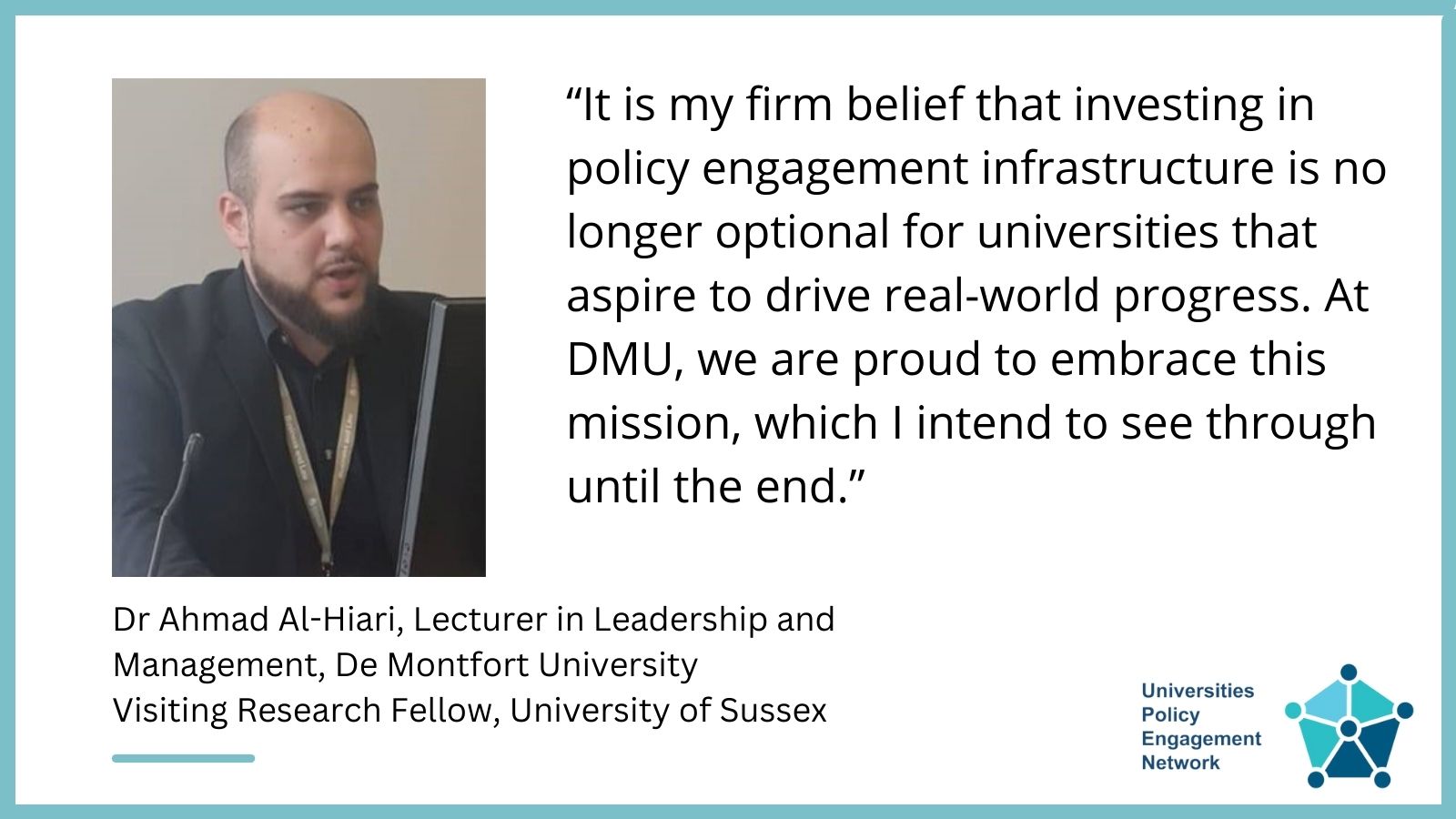

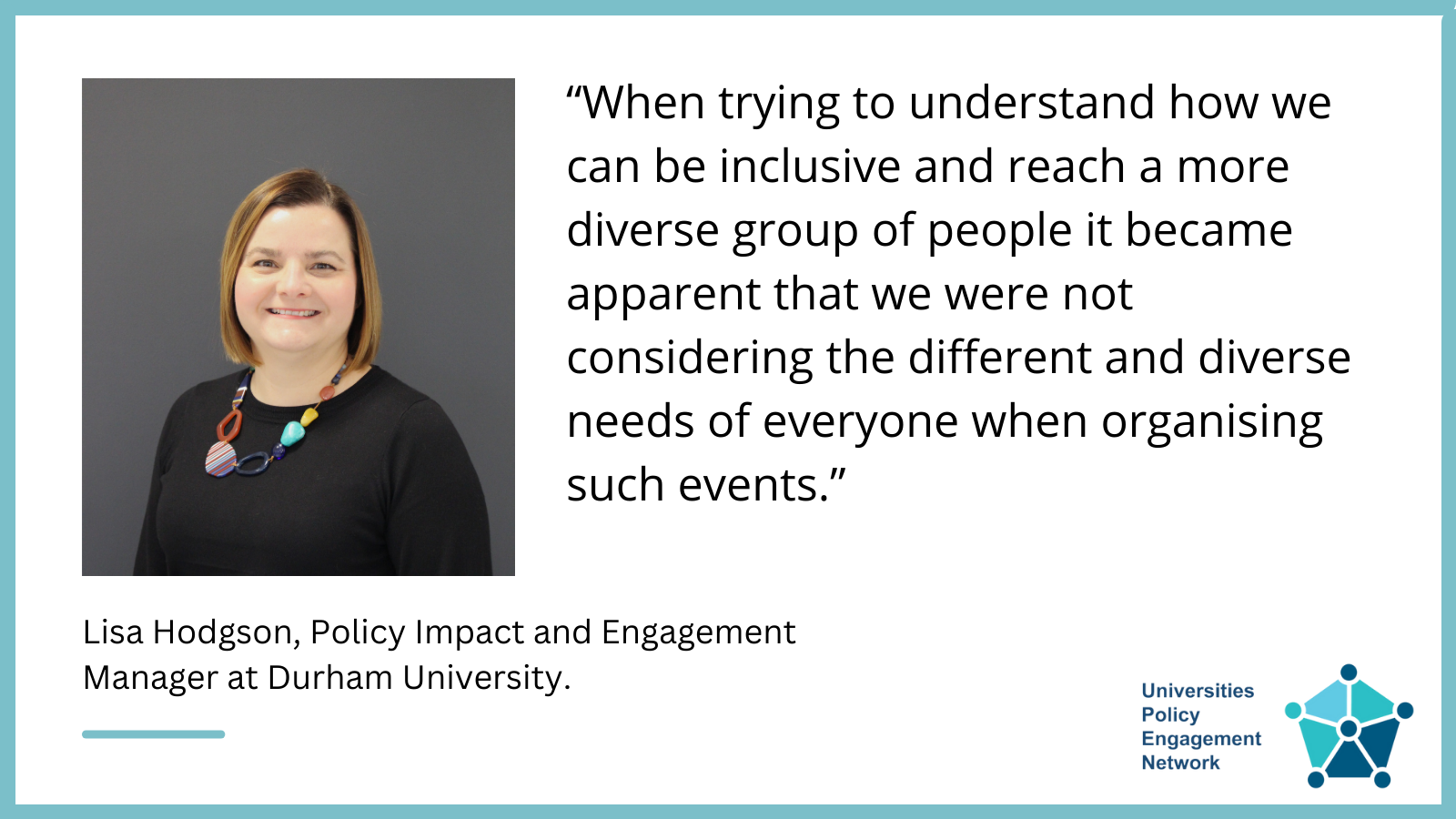
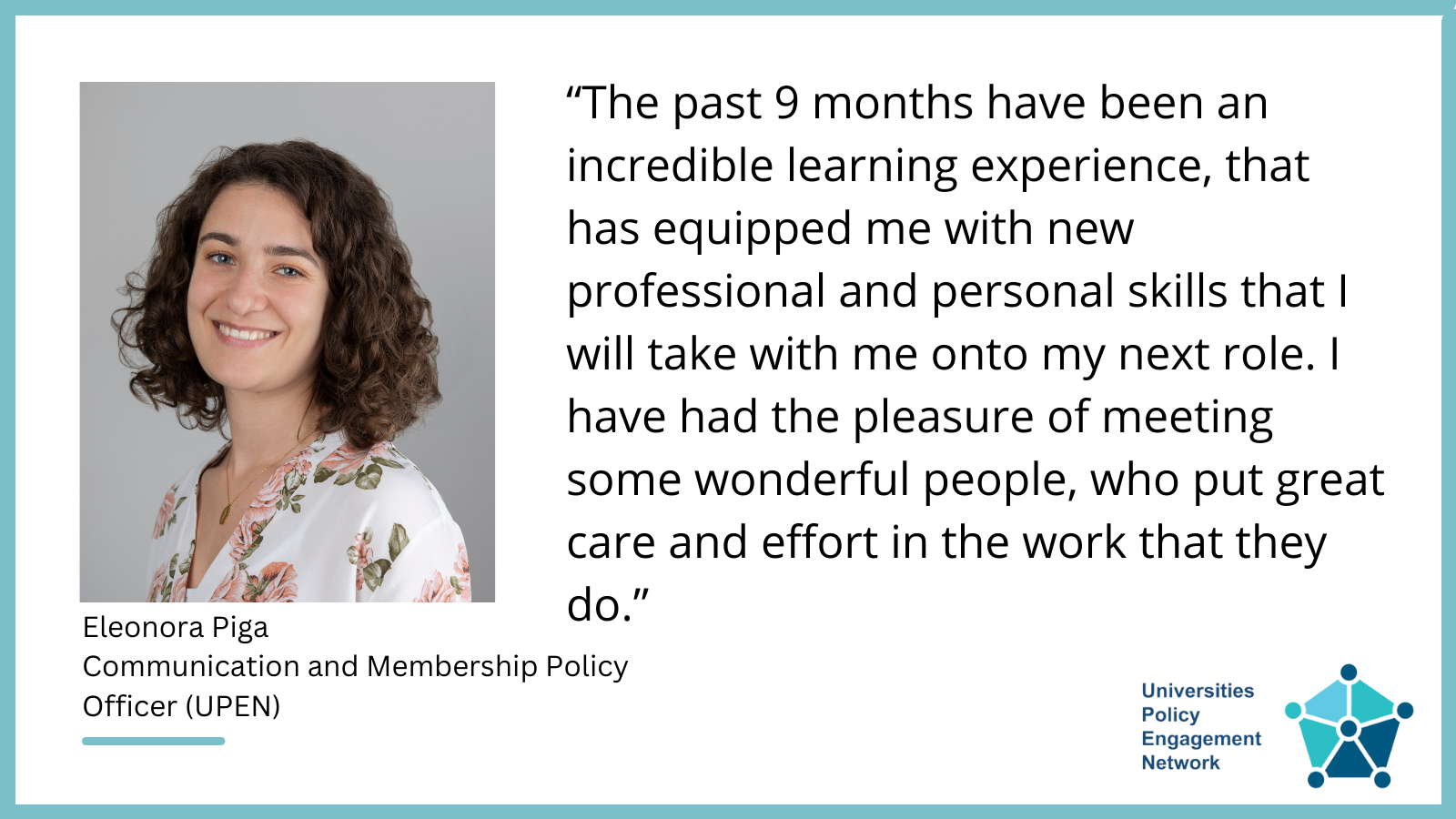
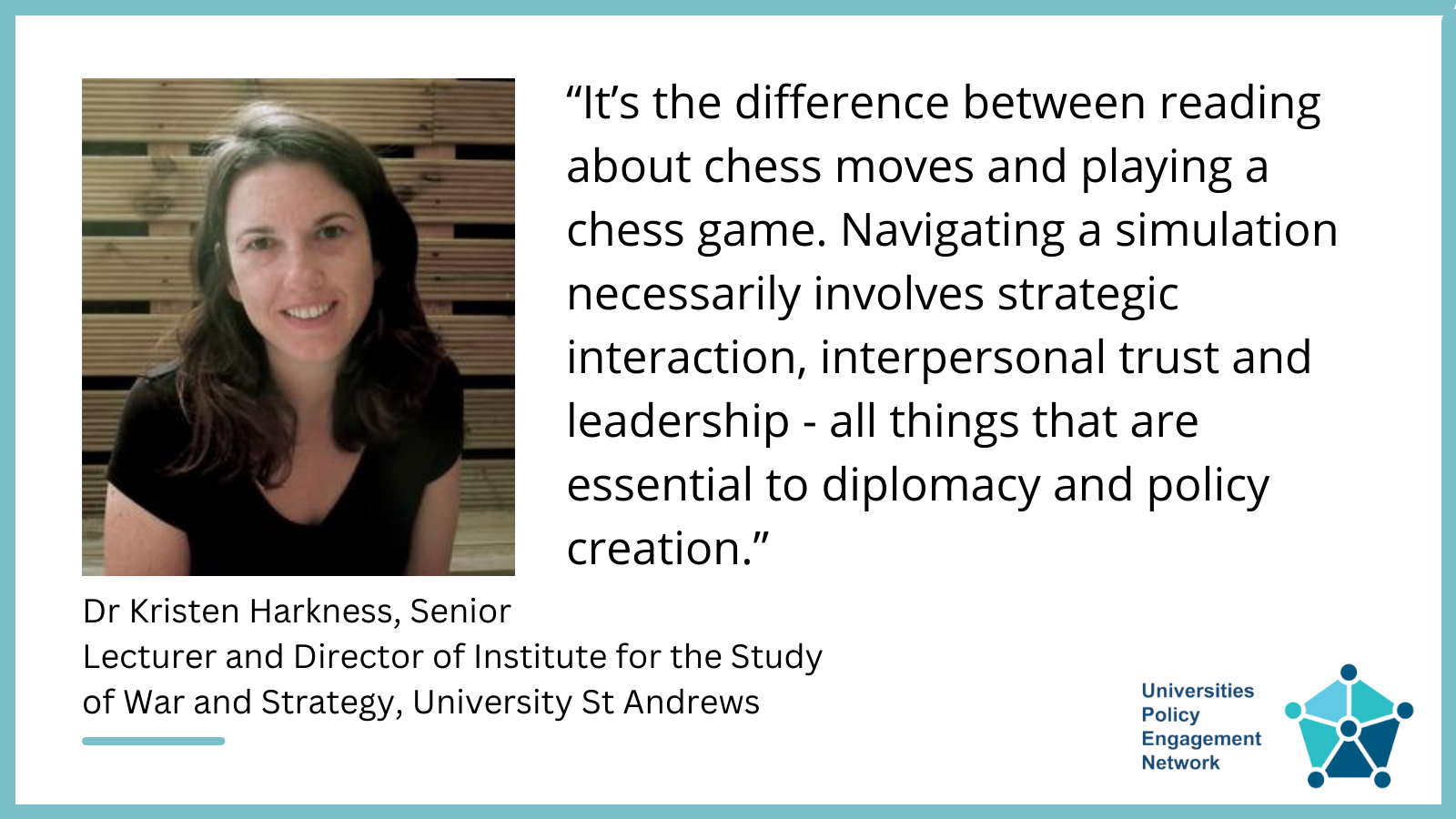
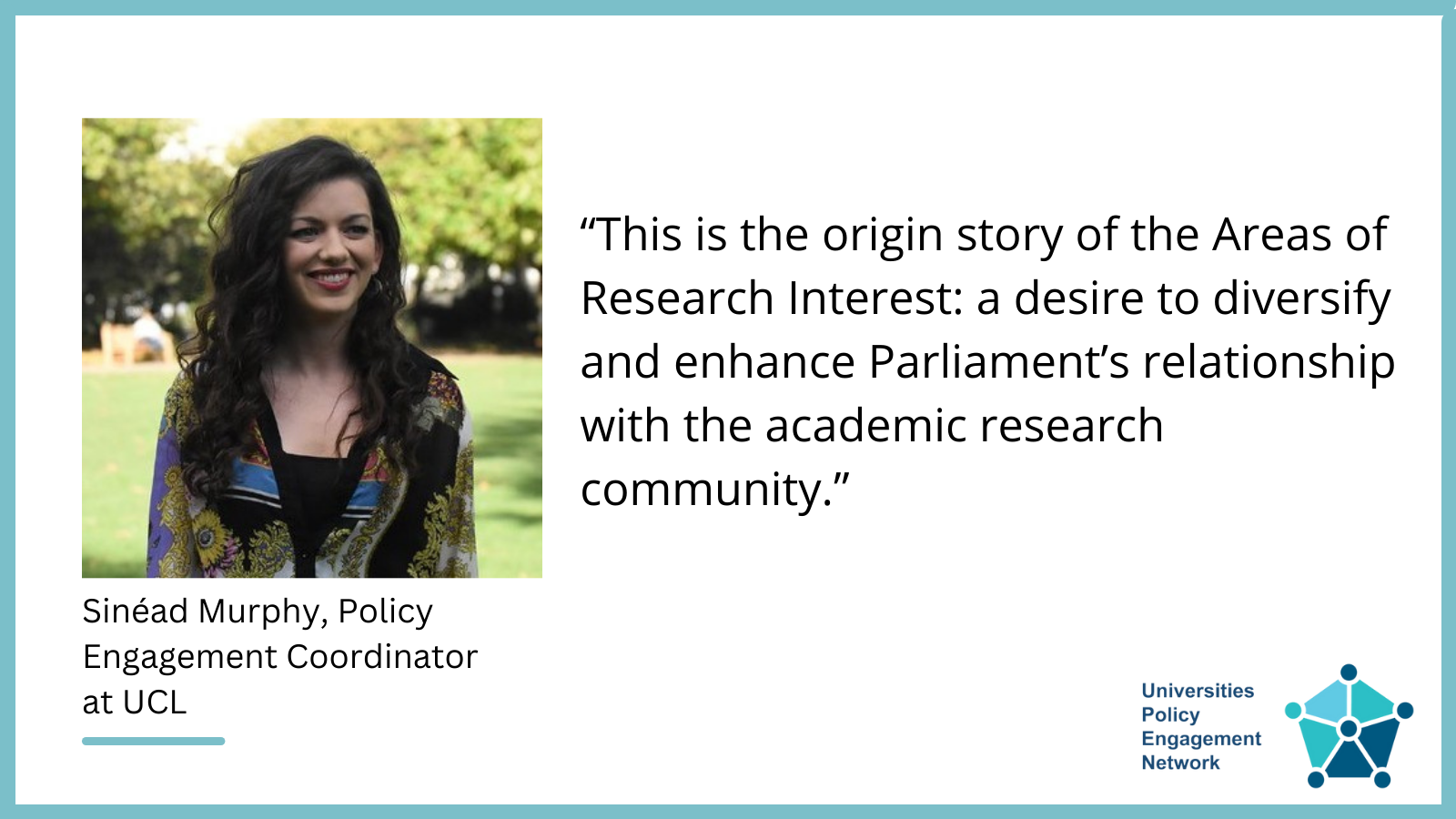
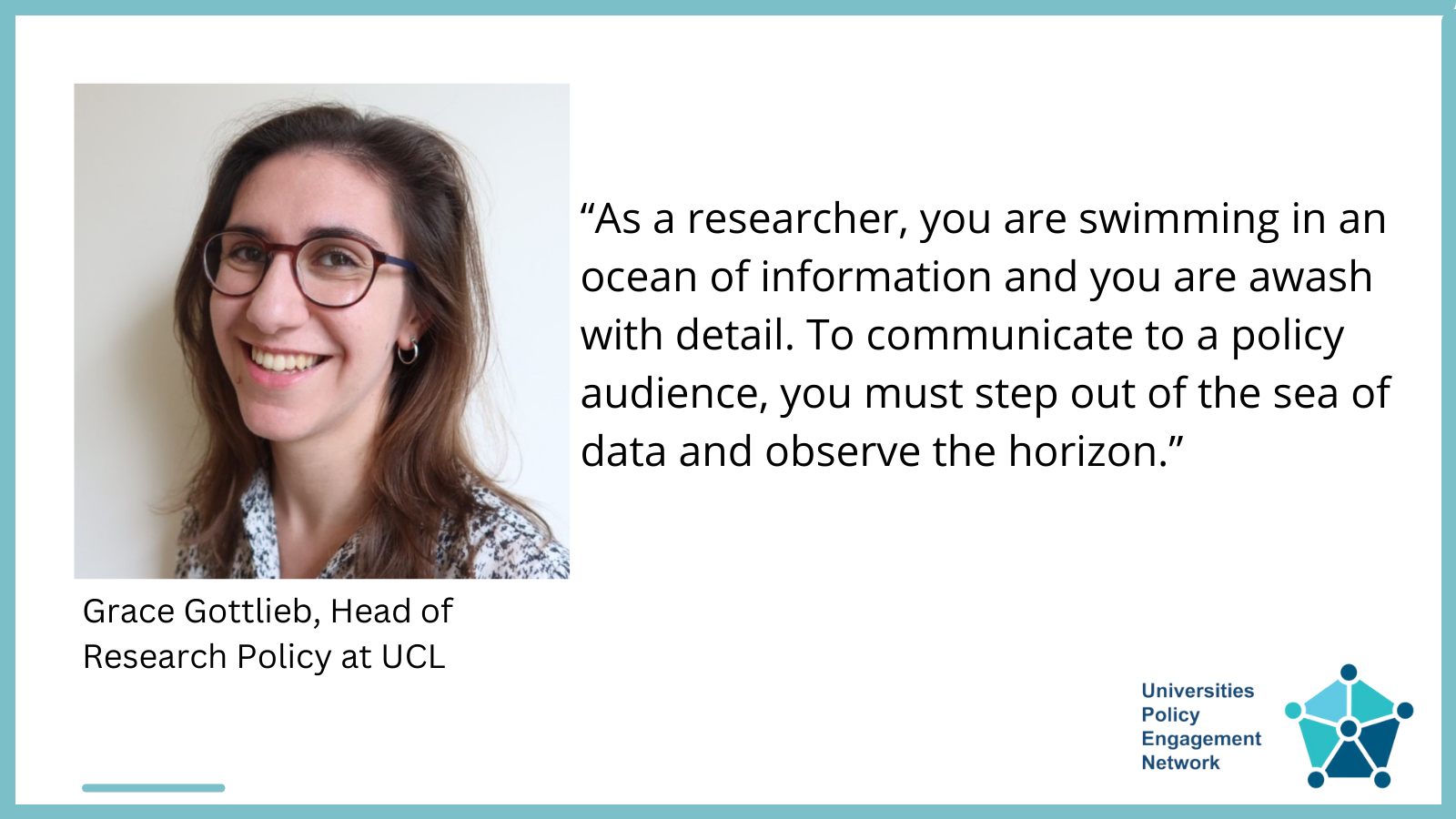
_0.png)
